Climate Control
11 Heat Pump Tips for Optimal Home Climate Control

Do you often find yourself either too chilly or too sweltering within the confines of your home? Fear not, for we have your back with 11 essential tips on how to effectively use a heat pump for the perfect temperature management in your living space.
Imagine coming home to the perfect temperature every day, without wasting energy or breaking the bank. With regular maintenance, proper insulation, and understanding the ideal temperature settings, you can create a comfortable and efficient environment for your family.
Let us guide you through the process of achieving the ultimate home comfort experience.
Key Takeaways
- Regular maintenance, including inspections, cleanings, and filter replacements, is crucial for improving efficiency and extending the lifespan of a heat pump.
- Proper insulation and energy-efficient practices, such as sealing air leaks and installing insulation, reduce the required size of the heat pump and maximize energy efficiency.
- Adjusting temperature settings based on preferences and weather conditions, as well as understanding the different heat pump modes, allows for optimal temperature control and energy efficiency.
- Utilizing programmable thermostats, maximizing airflow, and managing humidity levels through proper ventilation and the use of humidifiers/dehumidifiers are important for energy efficiency and maintaining a comfortable indoor environment.
Regular Maintenance for Improved Performance
We should regularly maintain our heat pump to ensure optimal performance. Regular maintenance is essential for improving efficiency and extending the lifespan of our heat pump. By scheduling regular inspections and cleanings, we can prevent any potential issues from arising and ensure that our heat pump operates at its maximum potential.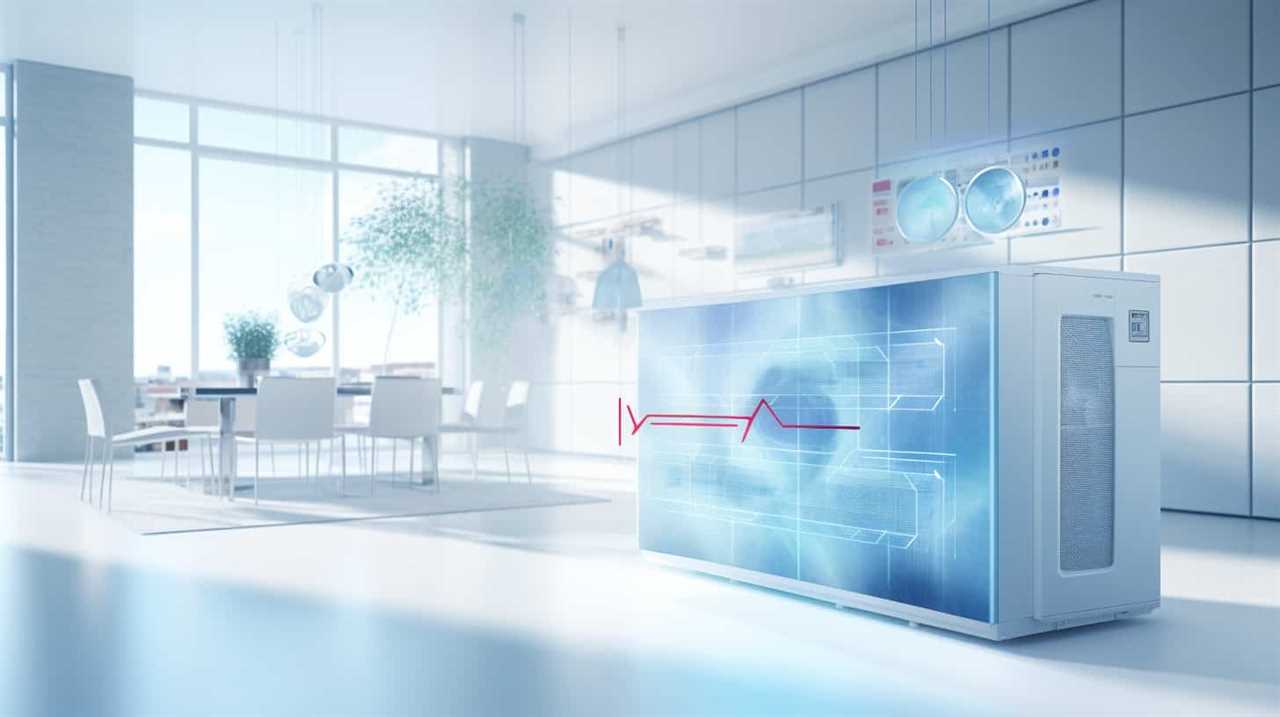
It’s important to clean or replace air filters regularly to maintain proper airflow and prevent dust and debris from accumulating. Additionally, checking and cleaning the evaporator and condenser coils can help improve heat transfer and overall efficiency. Lubricating moving parts and inspecting electrical connections are also crucial steps in maintaining our heat pump.
Choosing the Right Heat Pump Size for Your Home
When it comes to choosing the right heat pump size for your home, there are several sizing considerations that should be taken into account.
The size of your home, the climate in your area, and the insulation levels in your home are all important factors to consider.
It’s crucial to match the heat pump’s capacity with the heating and cooling needs of your home, as an oversized or undersized unit can lead to inefficiency and discomfort.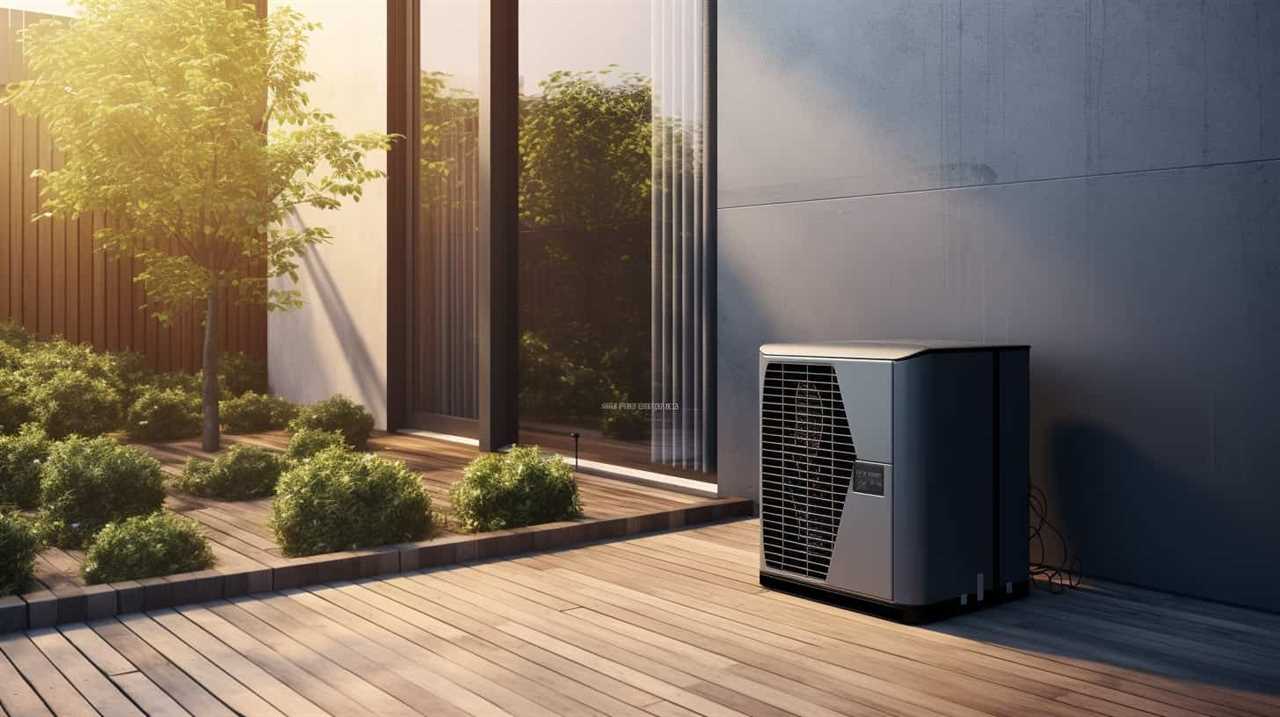
Sizing Considerations for Efficiency
Choosing the correct size of heat pump for our home is crucial for ensuring optimal efficiency and climate control. When it comes to sizing considerations for efficiency, there are several factors to keep in mind:
Climate conditions: The climate in which we live plays a significant role in determining the size of heat pump needed. Warmer climates require smaller heat pumps, while colder climates require larger ones.
Insulation levels: Proper insulation is essential for maintaining energy efficiency. Homes with better insulation will require smaller heat pumps.
Square footage: The size of our home directly impacts the size of the heat pump required. Larger homes will need larger heat pumps to effectively heat or cool the entire space.

Energy efficiency rating: Opting for energy efficient heat pump models can help us save on energy bills and reduce our carbon footprint.
Matching Heat Pump Capacity
Determining the appropriate heat pump size for our home involves matching the heat pump capacity to our specific heating and cooling needs. This is crucial for achieving optimal home climate control and maximizing energy efficiency. When it comes to matching heat pump efficiency, it’s important to consider factors such as the size of our home, insulation levels, and local climate conditions.
Choosing the right heat pump brand is also essential in ensuring long-term performance and reliability. Conducting thorough research and consulting with HVAC professionals can help us find the right heat pump brand that meets our requirements in terms of capacity, energy efficiency, and cost-effectiveness.
Proper Insulation for Energy Efficiency
We can improve energy efficiency in our homes by properly insulating them. Insulation plays a crucial role in reducing heat transfer and maintaining a comfortable indoor environment. Here are some energy-saving techniques and insulation materials to consider: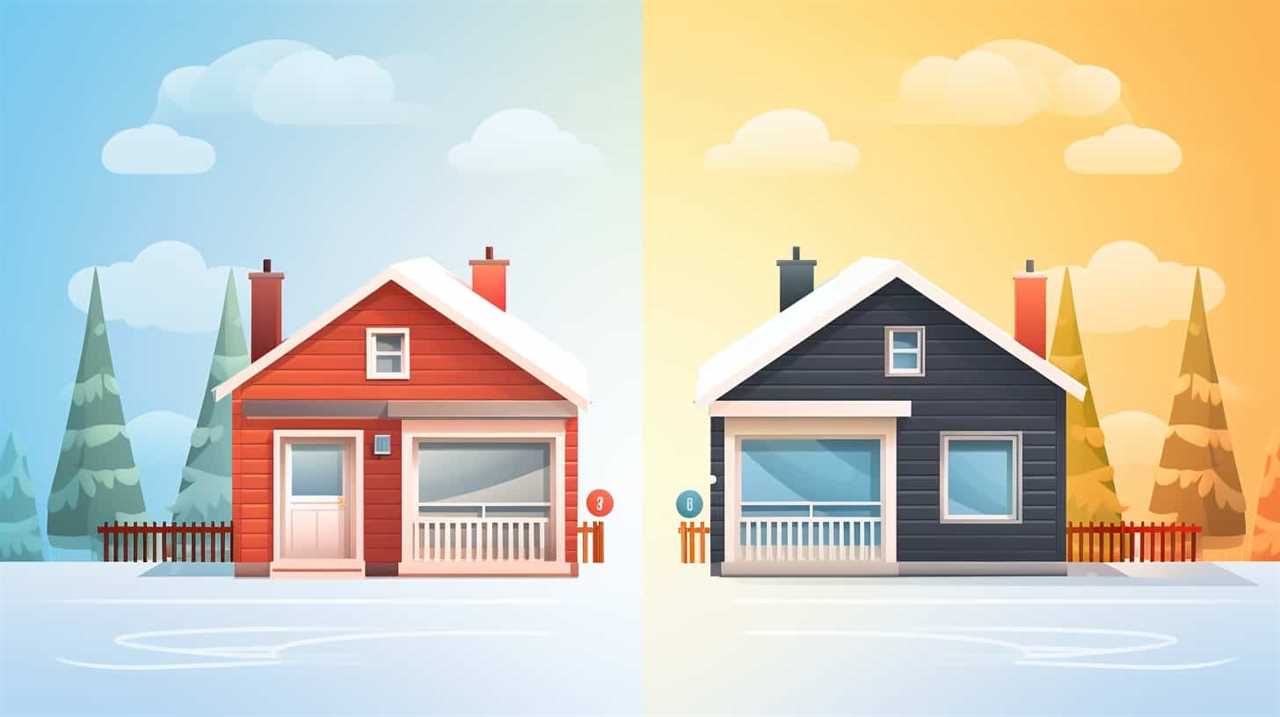
Sealing air leaks: Identify and seal any gaps or cracks in doors, windows, and walls to prevent air leakage, keeping your home well-insulated.
Adding insulation: Install insulation in walls, attics, and crawl spaces to reduce heat loss or gain, ensuring optimal energy efficiency.
Using reflective barriers: Reflective barriers, such as radiant barriers or reflective insulation, can reflect heat away from your home, reducing the need for excessive cooling.
Choosing the right insulation material: Opt for insulation materials with high R-values, such as fiberglass, cellulose, or spray foam, to maximize thermal resistance and energy savings.

Setting the Ideal Temperature for Comfort
To achieve optimal comfort, we should regularly adjust the temperature settings of our heat pump based on our preferences and the current weather conditions.
Setting temperature preferences is an essential step in creating a comfortable home environment. By adjusting the thermostat settings, we can ensure that our heat pump maintains the desired temperature throughout the day.
During colder weather, we can set the temperature higher to keep our home warm and cozy. Conversely, during hotter weather, we can lower the temperature to create a cool and refreshing atmosphere.
It’s important to strike a balance between comfort and energy efficiency. By finding the ideal temperature that suits our needs, we can create a comfortable living space while also saving on energy costs.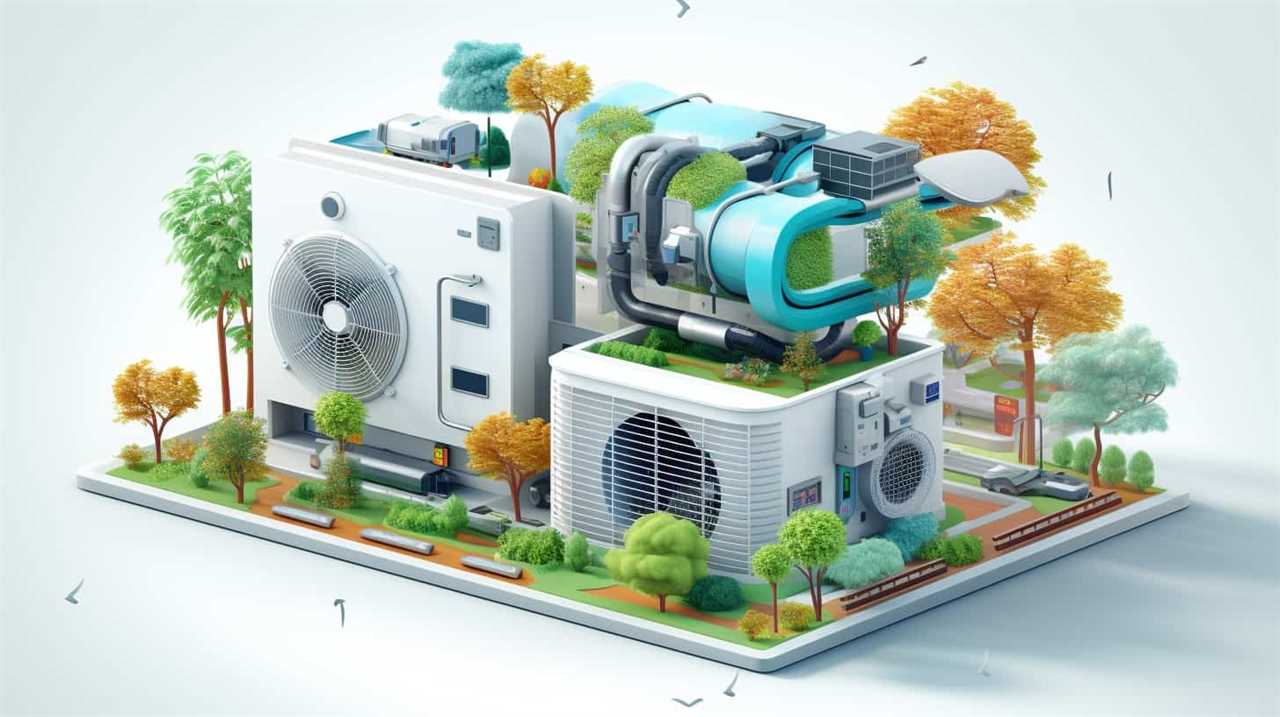
Regularly adjusting our heat pump’s temperature settings allows us to maintain optimal comfort throughout the year.
Understanding Heat Pump Modes and Settings
To effectively manage our heat pump and achieve optimal home climate control, it’s important to understand the various modes and settings available. Here are some key points to consider:
Heat Pump Modes: Our heat pump offers different modes to suit varying weather conditions. The most common modes include heating, cooling, and auto mode, which automatically switches between heating and cooling based on the desired temperature setting.
Temperature Settings: We can adjust the temperature settings to maintain a comfortable indoor environment. However, it’s crucial to strike a balance to ensure heat pump energy efficiency while still providing adequate heating or cooling.

Fan Speed: The fan speed setting allows us to control the airflow in our home. Higher fan speeds can distribute air more quickly, while lower speeds provide a quieter operation.
Heat Pump Maintenance Checklist: Regular maintenance is essential to keep our heat pump running efficiently. This includes cleaning or replacing air filters, inspecting outdoor units for debris, and scheduling professional maintenance checks.
Understanding these heat pump modes and settings, along with following a maintenance checklist, will help us optimize energy efficiency and maintain a comfortable home climate.
Utilizing Programmable Thermostats for Optimal Control
When it comes to optimizing control over home climate, utilizing programmable thermostats offers several benefits.
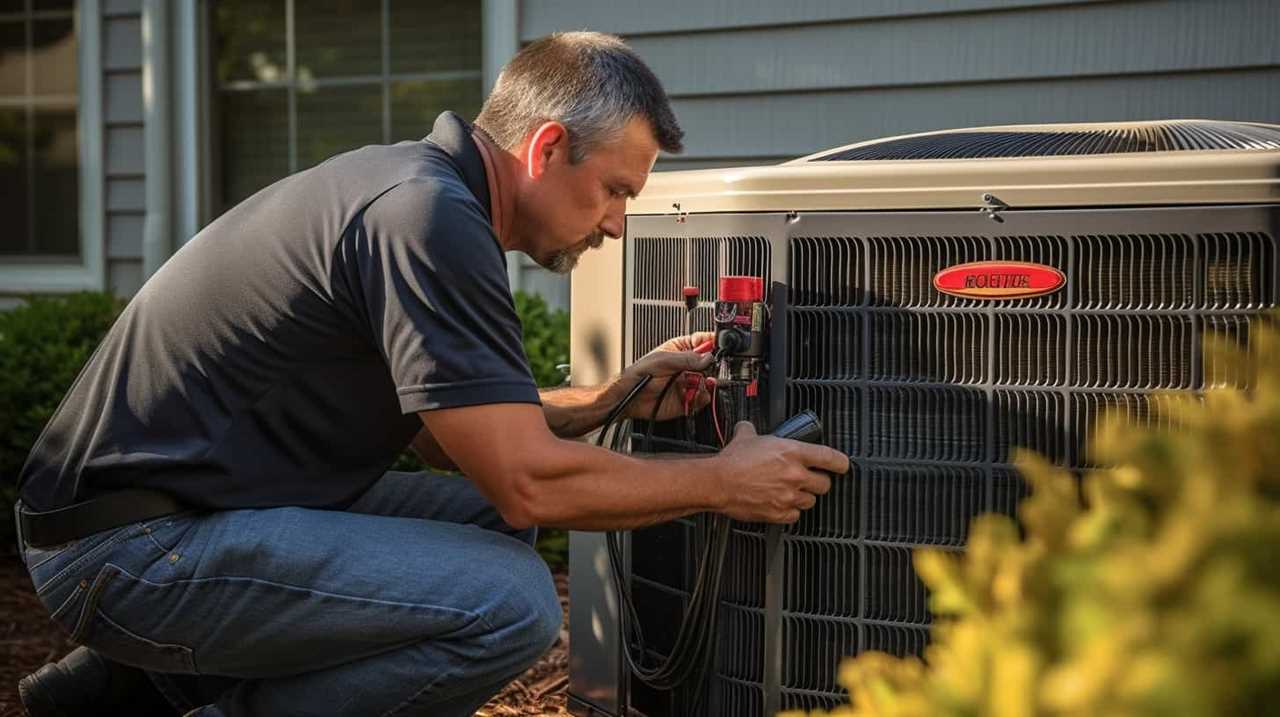
Firstly, these thermostats allow us to create energy-saving temperature schedules, ensuring that our homes are always at the right temperature without wasting unnecessary energy.
Additionally, programmable thermostats provide the convenience of remote control, allowing us to adjust the temperature from anywhere in the house.
Energy-Saving Temperature Schedules
How can we effectively use programmable thermostats to create energy-saving temperature schedules for optimal home climate control?
Utilizing energy-saving temperature presets on smart thermostats is a great way to achieve this goal. By programming your thermostat to adjust the temperature settings based on your daily routine, you can ensure that your home is always comfortable while minimizing energy consumption.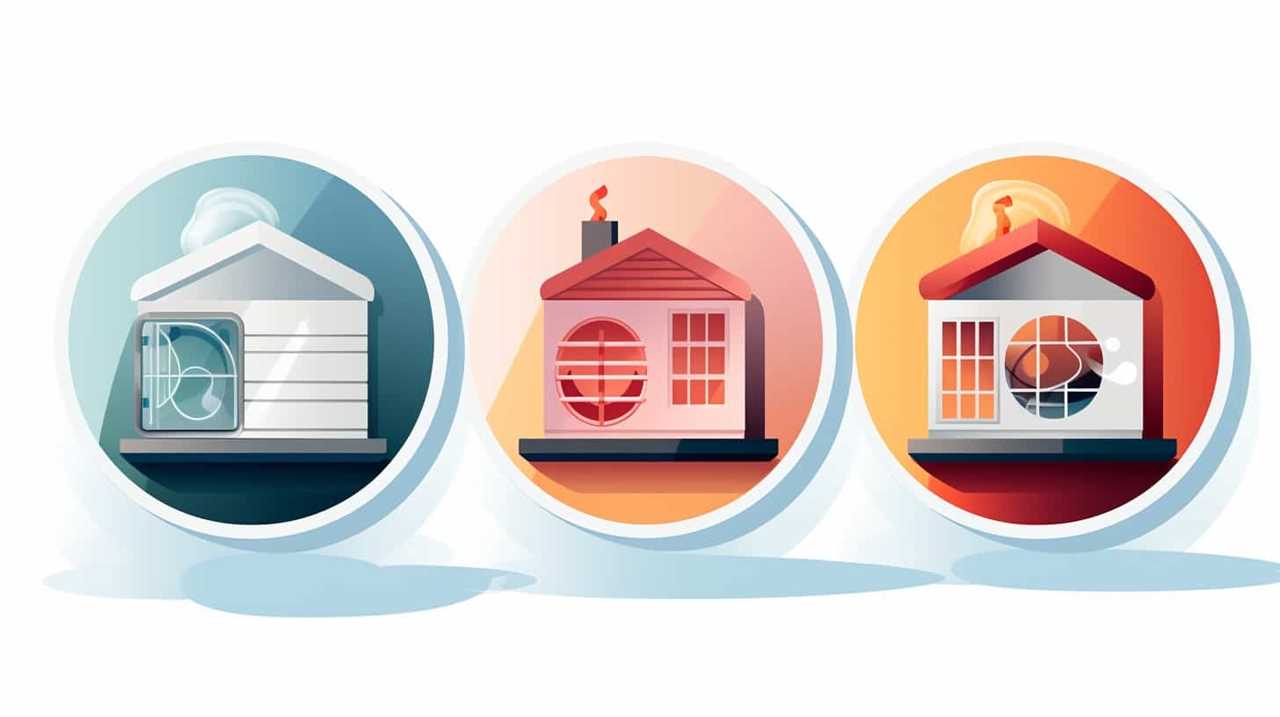
Here are some tips for creating energy-saving temperature schedules:
- Set the temperature lower during times when you’re away from home or asleep.
- Gradually adjust the temperature before waking up or returning home to maintain comfort.
- Use zoning features to control the temperature in different areas of your home independently.
- Take advantage of features like geofencing to automatically adjust the temperature when you leave or return home.
Remote Control Convenience
We can enhance our home climate control by utilizing programmable thermostats and taking advantage of remote control convenience. With remote control features and smart home integration, we can easily adjust the temperature from anywhere in the house or even when we’re away. This convenience allows us to come home to a comfortable environment or save energy by adjusting the temperature when we’re not home.
To further emphasize the benefits of remote control convenience, let’s take a look at the table below:
| Remote Control Features | Benefits |
|---|---|
| Adjust temperature from anywhere | Convenient and saves energy |
| Set temperature schedules | Optimize comfort and energy savings |
| Monitor energy usage | Track and manage energy consumption |
Maximizing Airflow for Efficient Heating and Cooling
To maximize airflow and ensure efficient heating and cooling, we need to regularly clean and maintain our HVAC system. Here are some tips to help you achieve optimal airflow and energy efficiency:

Clear any obstructions: Make sure there are no furniture, curtains, or other objects blocking the vents or airflow paths.
Clean or replace air filters: Clogged filters restrict airflow and reduce system efficiency. Regularly clean or replace them to improve air quality and energy efficiency.
Check ductwork for leaks: Leaky ducts can cause air to escape, resulting in reduced airflow and energy loss. Seal any leaks to improve efficiency.
Schedule professional maintenance: Regular maintenance by a qualified HVAC technician can ensure that your system is operating at peak performance, maximizing airflow and energy efficiency while improving air quality for your health benefits.
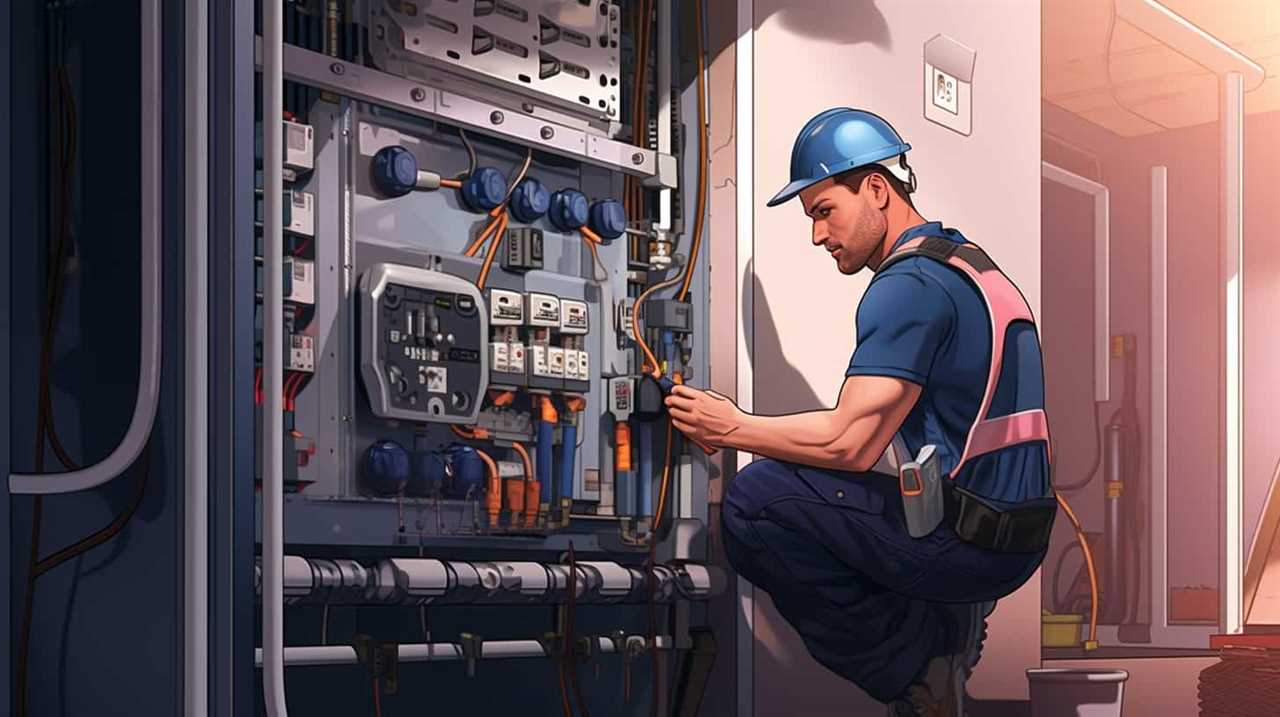
Protecting Your Heat Pump From Outdoor Elements
To ensure the longevity and optimal performance of your heat pump, it’s crucial to protect it from the harsh outdoor elements.
One effective way to do this is by covering the heat pump properly when it isn’t in use. This will shield it from rain, snow, and debris that can potentially damage its components.
Additionally, regular maintenance and cleaning are essential to keep the heat pump functioning efficiently and to prevent any potential issues caused by dirt or debris buildup.
Covering Heat Pump Properly
Our heat pump’s proper covering is essential for protecting it from outdoor elements. Here are some tips for covering your heat pump installation effectively:
Use a weather-resistant cover: Invest in a cover specifically designed to withstand the elements and protect your heat pump from rain, snow, and UV rays.
Maintain proper airflow: Ensure that the cover allows for adequate ventilation, as restricted airflow can negatively impact heat pump efficiency.
Secure the cover properly: Use straps or fasteners to secure the cover tightly, preventing it from being blown away by strong winds.
Regularly inspect and clean: Regularly check the cover for any signs of damage or wear. Clean it as needed to remove debris and maintain its effectiveness.
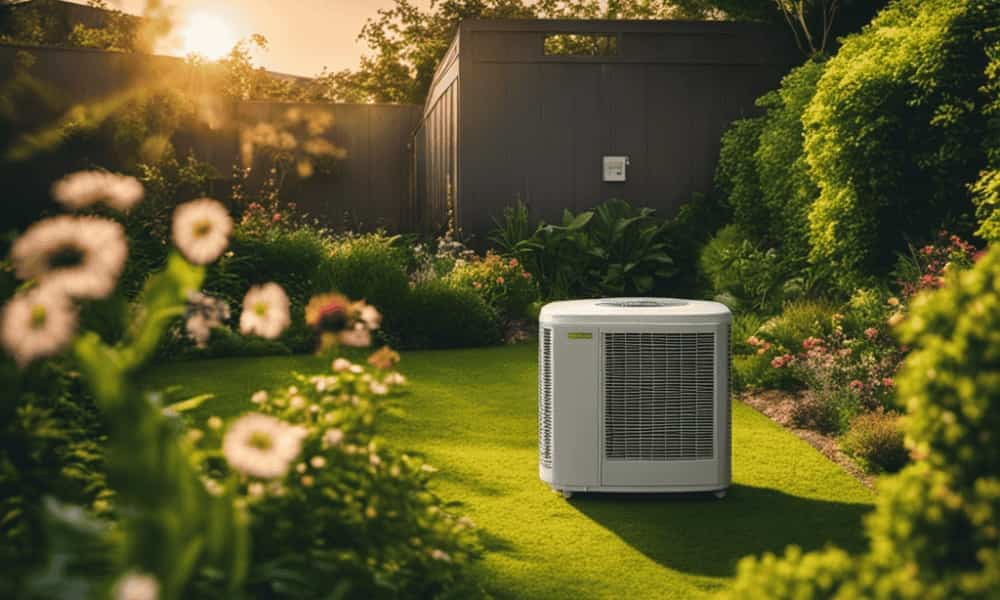
Regular Maintenance and Cleaning
We recommend scheduling regular maintenance and cleaning to protect our heat pump from outdoor elements.
Regular maintenance is crucial to ensure the optimal performance and longevity of the heat pump. It’s recommended to have a professional technician inspect and service the heat pump at least once a year. This will help identify any potential issues and prevent costly repairs in the future.
In addition to regular maintenance, proper cleaning techniques are essential to keep the heat pump functioning efficiently. It’s important to regularly clean the outdoor unit by removing any debris such as leaves, dirt, or grass clippings. This can be done by gently hosing down the unit and using a soft brush to remove any stubborn dirt.
Managing Humidity Levels for Enhanced Comfort
Maintaining optimal humidity levels is crucial for enhanced comfort in our home climate. Proper humidity control not only helps us feel more comfortable, but it also promotes better indoor air quality and protects our home from potential damage caused by excessive moisture. Here are some key strategies and benefits of managing humidity levels: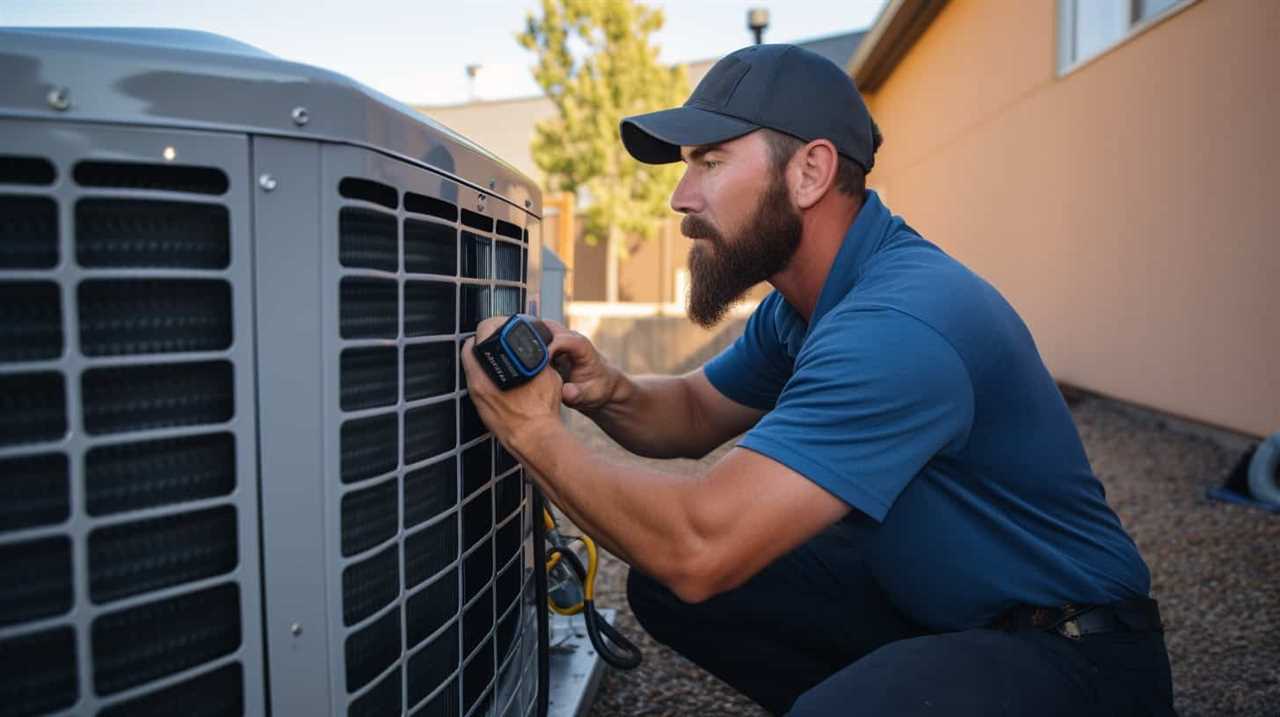
- Installing a dehumidifier can help remove excess moisture from the air, preventing mold growth and reducing the risk of respiratory issues.
- Monitoring humidity levels with a hygrometer allows us to adjust our HVAC system or dehumidifier settings accordingly.
- Ventilating our home properly, such as using exhaust fans in bathrooms and kitchens, helps to remove moisture from the air.
- Sealing air leaks and insulating our home can prevent humid outdoor air from entering and causing moisture problems.
By implementing these humidity control strategies, we can create a more comfortable and healthier indoor environment.
Now, let’s move on to troubleshooting common heat pump issues.
Troubleshooting Common Heat Pump Issues
Let’s now address some common heat pump issues that may arise and how to troubleshoot them.
When it comes to troubleshooting common heat pump problems, there are a few key issues that homeowners often encounter. One of the most common problems is the heat pump not turning on or not cooling or heating effectively. This can be caused by a faulty thermostat, a tripped circuit breaker, or a refrigerant leak.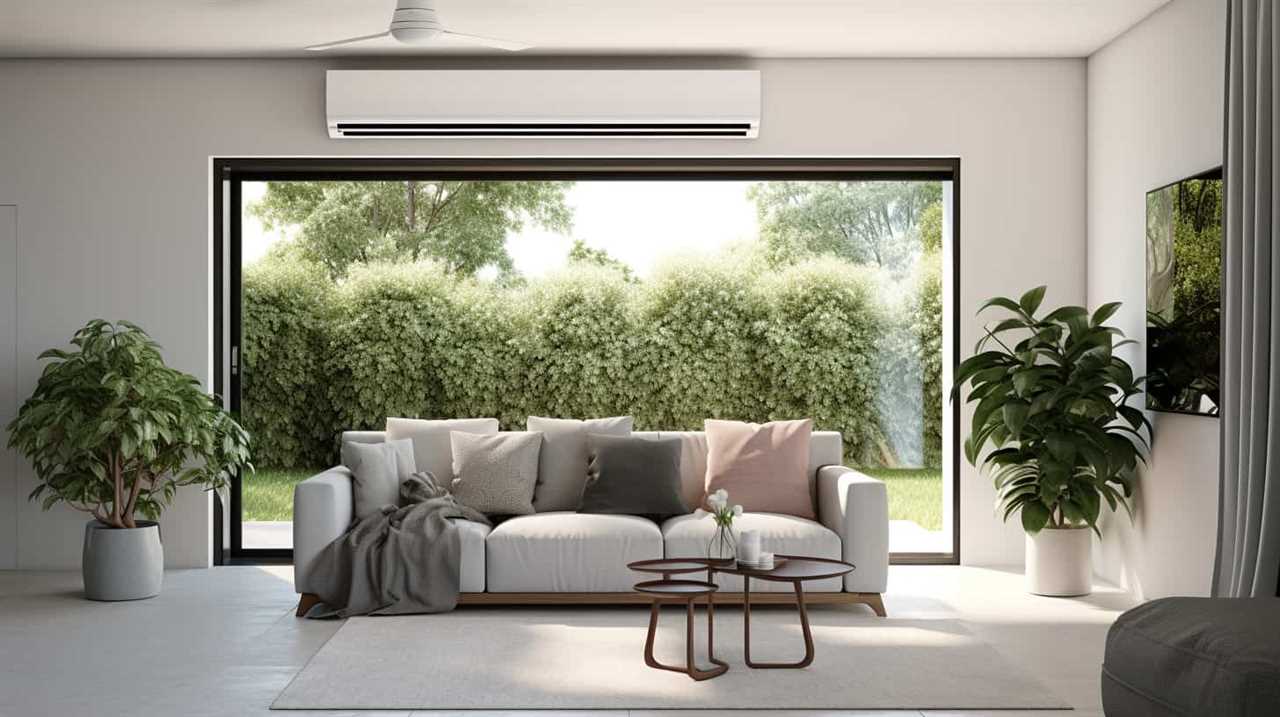
To troubleshoot this issue, check the thermostat settings, reset the circuit breaker, and inspect for any signs of refrigerant leakage.
Another common problem is the heat pump blowing cold air instead of warm air. This could be due to a dirty air filter, a malfunctioning reversing valve, or low refrigerant levels.
To resolve this issue, clean or replace the air filter, check the reversing valve, and ensure the refrigerant levels are adequate.
Energy-Saving Tips for Lower Utility Bills
By implementing energy-saving practices and making small adjustments to our daily routines, we can effectively lower our utility bills. Here are some tips to help you lower your energy consumption and save money on your monthly bills: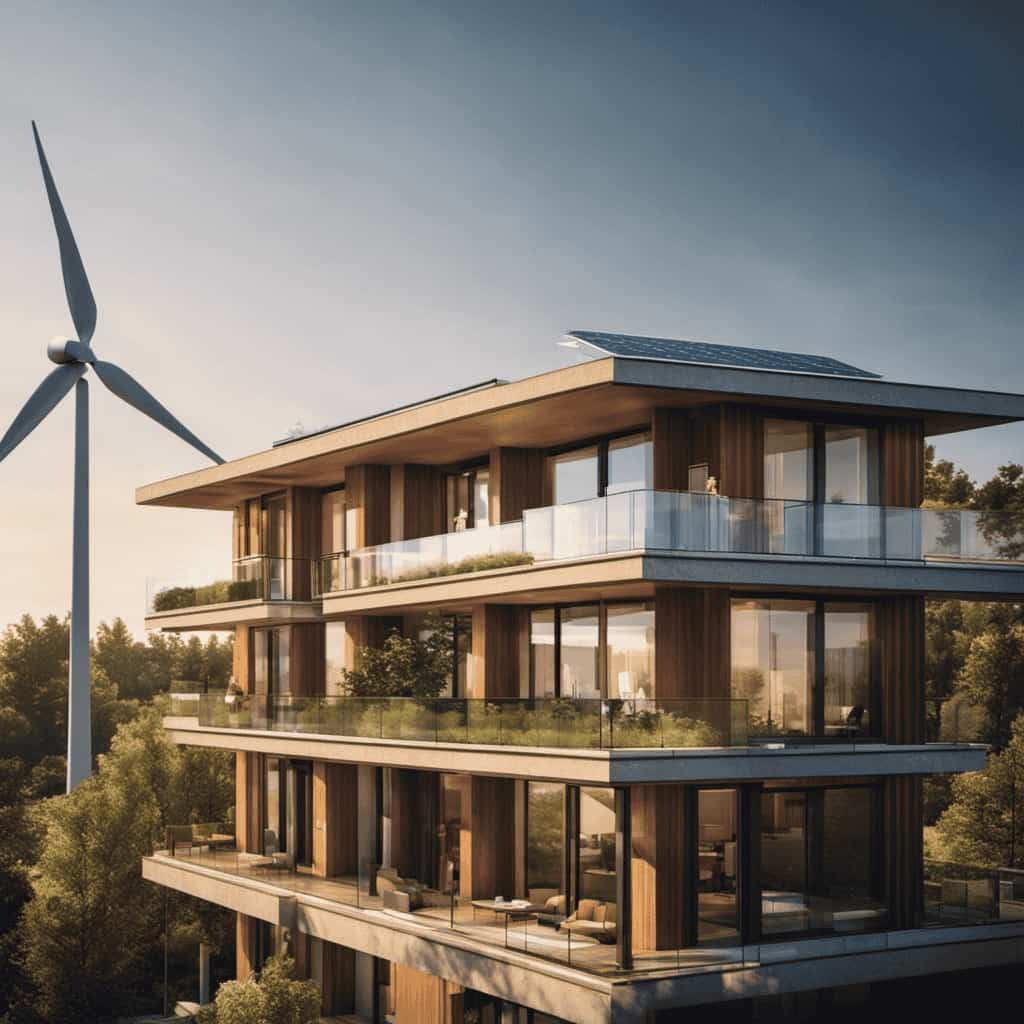
Upgrade to energy-efficient appliances: Replace old, energy-hungry appliances with new, energy-efficient models that have a high Energy Star rating.
Use smart home integration: Invest in smart home technology that allows you to control and monitor your energy usage remotely. This can help you identify areas where you can reduce energy consumption and save money.
Optimize your thermostat settings: Set your thermostat to a comfortable temperature while minimizing energy usage. Consider using programmable thermostats or smart thermostats that can automatically adjust temperature settings based on your preferences and occupancy patterns.
Practice energy-saving habits: Simple habits like turning off lights when not in use, unplugging electronics when not in use, and using natural light whenever possible can add up to significant energy savings over time.

Frequently Asked Questions
How Often Should I Schedule Regular Maintenance for My Heat Pump?
We recommend scheduling regular maintenance for your heat pump to ensure optimal performance and energy efficiency. By doing so, you can extend the lifespan of your system and prevent costly repairs in the long run.
What Factors Should I Consider When Choosing the Right Heat Pump Size for My Home?
When choosing the right heat pump size for your home, consider factors such as the square footage, insulation, and climate conditions. Proper heat pump installation ensures optimal home climate control and improves heat pump efficiency.
How Can I Improve the Insulation in My Home to Increase Energy Efficiency?
To improve insulation and increase energy efficiency, we can employ various techniques such as sealing air leaks, adding insulation to walls and ceilings, and upgrading windows and doors. These energy-saving upgrades help create a more comfortable and cost-effective home environment.
What Is the Ideal Temperature to Set My Heat Pump for Optimal Comfort?
The ideal temperature for optimal comfort with a heat pump is typically between 68-72 degrees Fahrenheit. This range ensures energy efficiency while providing a comfortable living environment for all occupants.
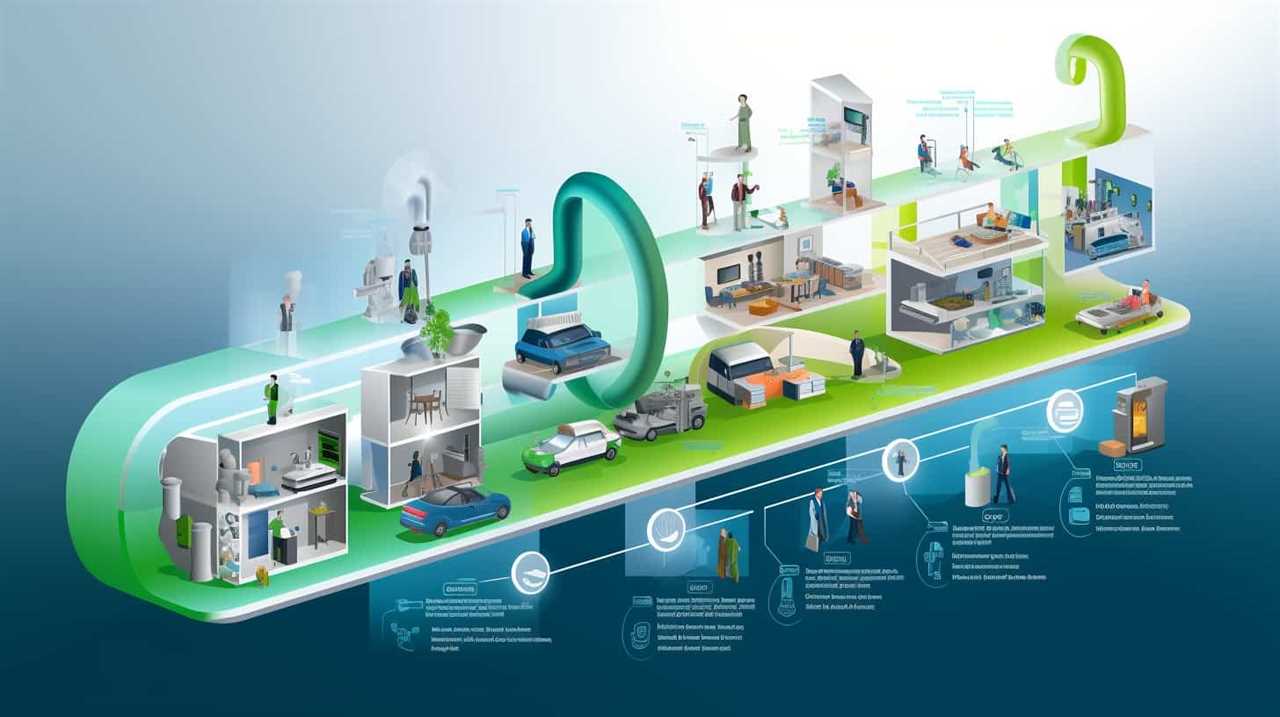
What Are the Different Heat Pump Modes and Settings, and How Do They Affect Heating and Cooling?
Heat pump modes and settings play a crucial role in heating and cooling, impacting energy consumption. Understanding these modes helps optimize home climate control. It’s important to consider the efficiency of each setting for optimal comfort and energy efficiency.
What Are the Benefits of Heat Pumps for Home Climate Control?
Heat pumps for climate control offer numerous benefits for home owners. They provide both cooling and heating capabilities, ensuring comfortable indoor temperatures in any season. Their energy efficiency helps lower utility bills, while their quiet operation ensures a peaceful living environment. Additionally, heat pumps can improve air quality by reducing humidity and filtering out pollutants, promoting a healthier home.
Conclusion
In conclusion, by following these 11 heat pump tips, you can achieve optimal home climate control.
It’s ironic how such a small device can have such a big impact on your comfort and energy efficiency.
So, take the time to maintain your heat pump, choose the right size, insulate properly, and manage settings effectively.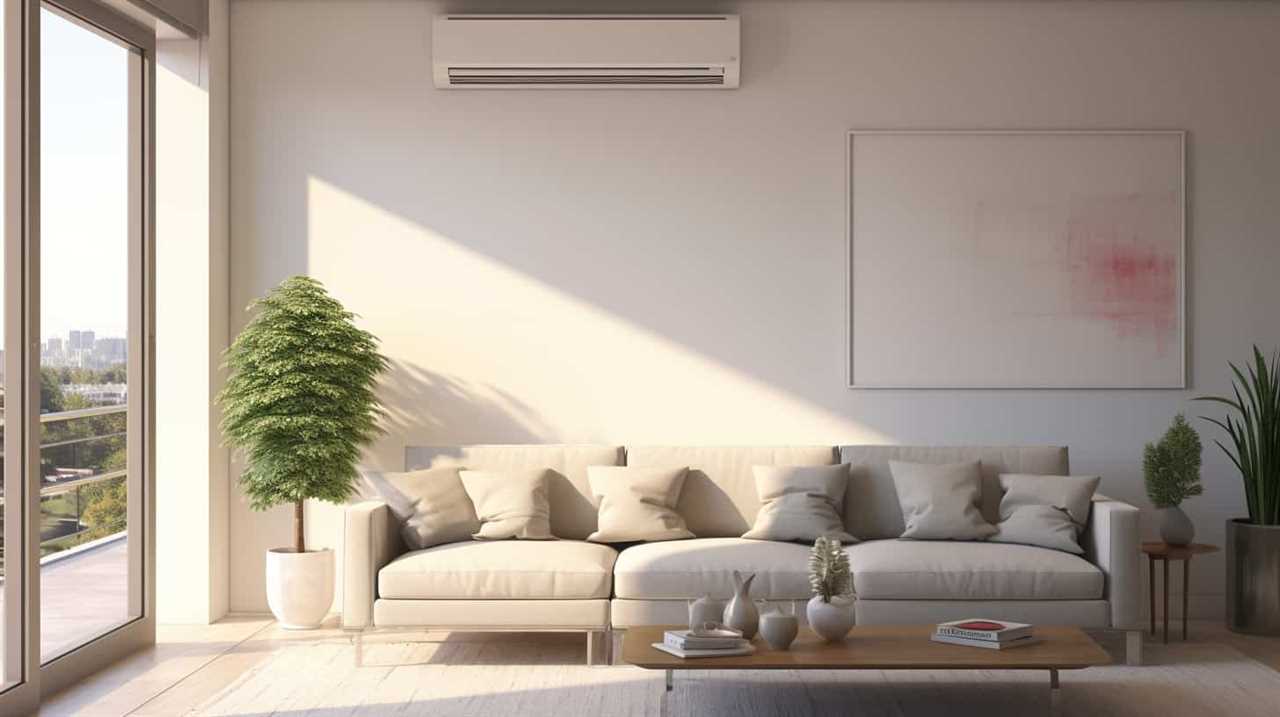
By doing so, you’ll not only stay comfortable but also save on utility bills.
Stay cool, my friends!
Climate Control
Unveiling the Efficiency Secrets of HVAC Heat Pumps

Prepare to discover the hidden treasures of HVAC heat pumps! In this article, we, your reliable experts, will unveil the efficiency tips that will transform your heating and cooling system.
By exploring the crucial role of proper insulation, optimizing airflow, selecting the right size, and maintaining your heat pump, we will empower you with the knowledge to achieve maximum efficiency.
Get ready to liberate your HVAC system and embrace a new era of comfort and cost savings.
Key Takeaways
- Proper insulation and weatherization are essential for maximizing HVAC heat pump efficiency.
- Regular maintenance, including filter cleaning and coil inspection, ensures optimal performance and longevity.
- Correctly sized and designed ductwork is crucial for balanced airflow and efficient operation.
- Advanced technologies such as smart controls and variable speed compressors can enhance heat pump efficiency and performance.
The Role of Proper Insulation in HVAC Heat Pump Efficiency
Why is proper insulation important for maximizing the efficiency of our HVAC heat pumps?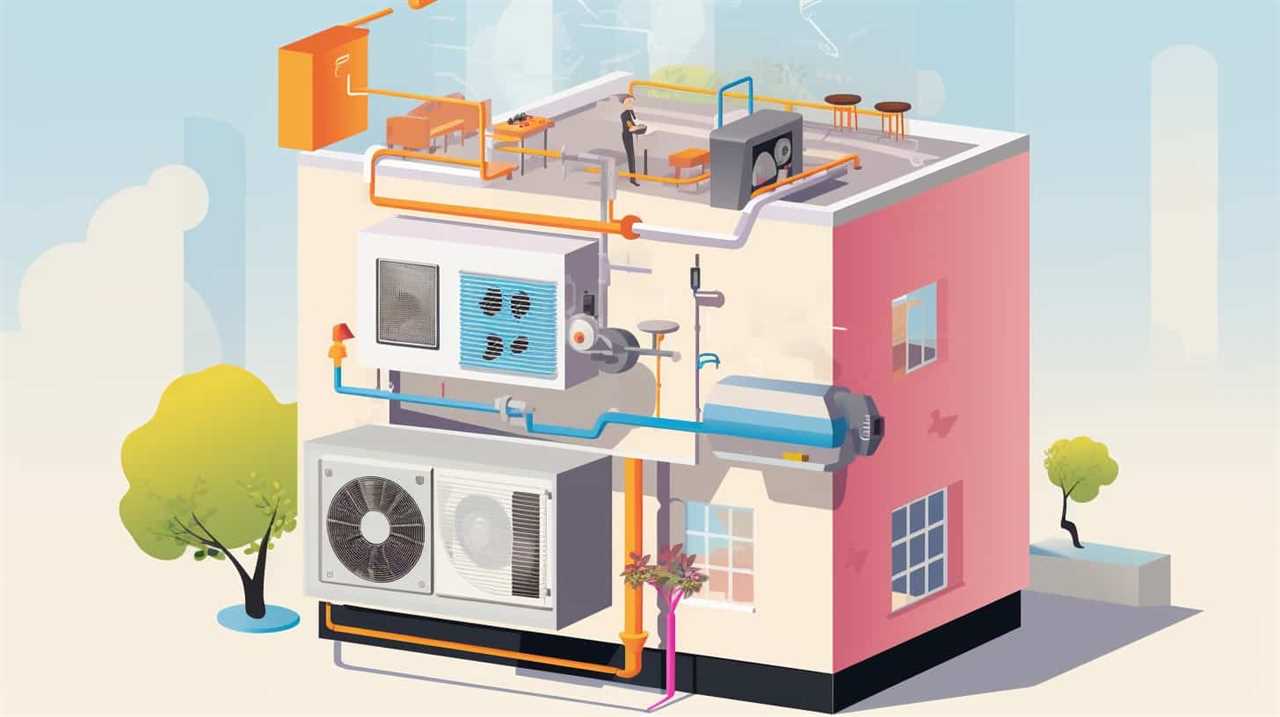
The role of weatherization in HVAC heat pump efficiency can’t be overstated. Proper insulation plays a crucial role in maintaining the desired indoor temperature while minimizing energy loss. Without adequate insulation, heat pumps must work harder to compensate for the escaped heat or cool air, resulting in reduced efficiency and increased energy consumption.
Additionally, the impact of ductwork on heat pump performance shouldn’t be overlooked. Leaky or poorly insulated ducts can lead to significant energy losses, compromising the overall efficiency of the system.
Optimizing Airflow for Enhanced HVAC Heat Pump Performance
To maximize the performance of our HVAC heat pumps, we need to optimize airflow for enhanced efficiency. Proper airflow management is crucial in achieving optimal heat pump operation and energy utilization. Here are three key strategies for heat pump optimization through airflow management:
Duct design and sizing: Ensure that the ductwork is correctly sized and designed to deliver the required airflow to each room. Improperly sized ducts can lead to air pressure imbalances and reduced system performance.
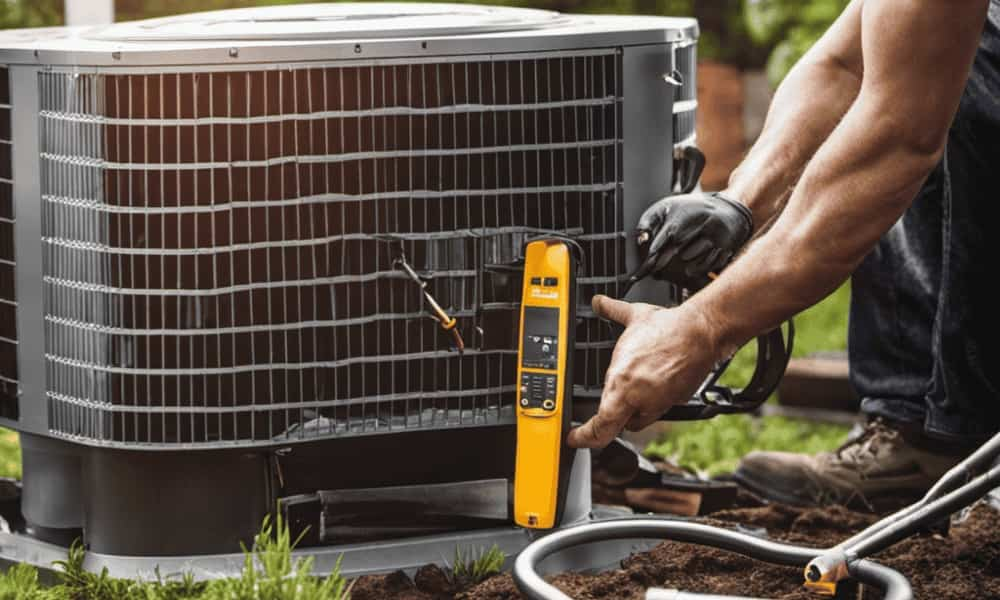
Regular filter maintenance: Clean or replace air filters regularly to prevent clogging and airflow restrictions. Restricted airflow can strain the heat pump, leading to decreased efficiency and increased energy consumption.
Airflow balancing: Balance the supply and return airflow throughout the system to maintain proper air distribution. Uneven airflow can result in hot or cold spots, reducing comfort and wasting energy.
Selecting the Right Size Heat Pump for Maximum Efficiency
We need to ensure that we select the right size heat pump for maximum efficiency. Sizing considerations play a crucial role in determining the energy consumption and overall performance of a heat pump.
Oversized heat pumps may lead to short cycling, where the unit turns on and off frequently, resulting in higher energy consumption and reduced efficiency.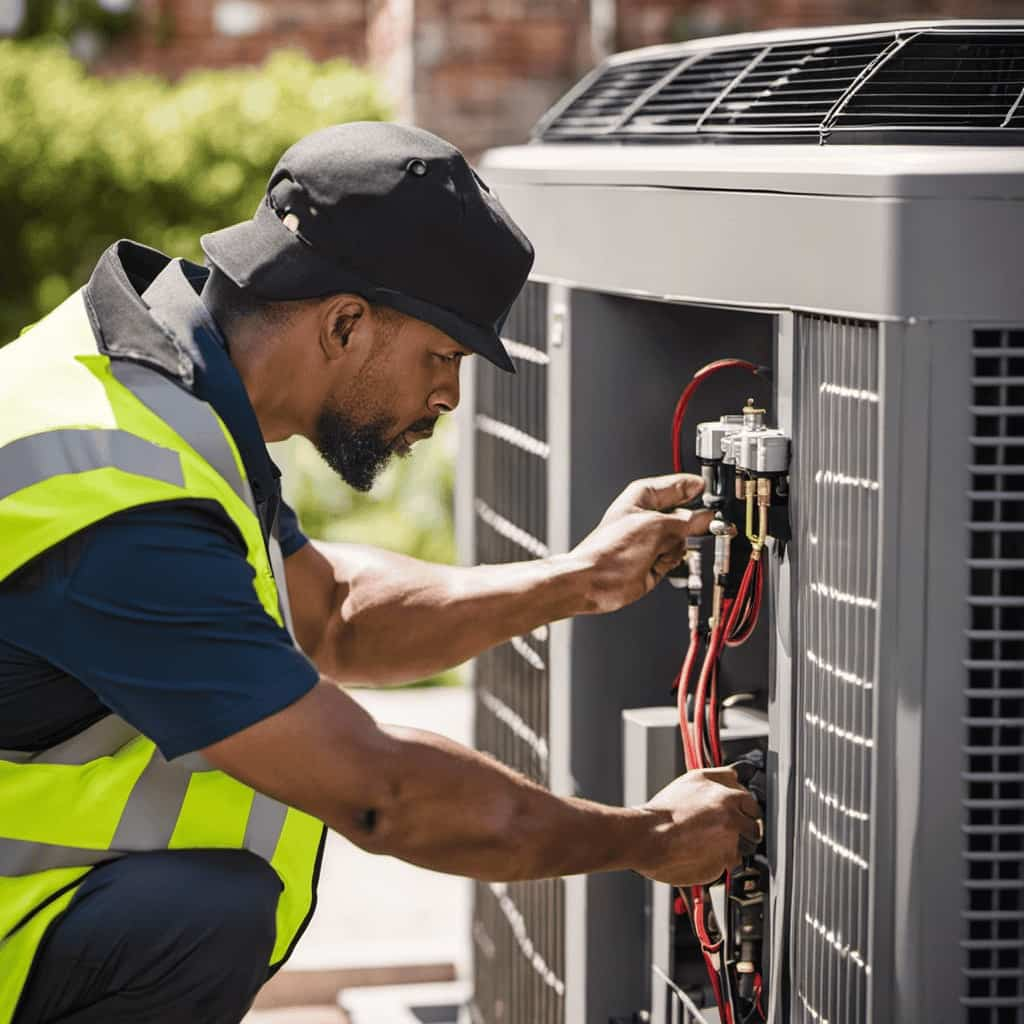
On the other hand, undersized heat pumps may struggle to meet the heating or cooling demands of the space, leading to increased energy usage and discomfort.
To select the right size heat pump, it’s important to consider factors such as the size and insulation of the space, climate conditions, and the heat pump’s heating and cooling capacity.
Conducting a thorough load calculation is essential to accurately determine the appropriate size of the heat pump for optimal efficiency.
The Importance of Regular HVAC Heat Pump Maintenance
Regular HVAC heat pump maintenance is essential for optimal performance and longevity. To ensure your heat pump operates at its best, it’s important to follow a regular maintenance checklist:
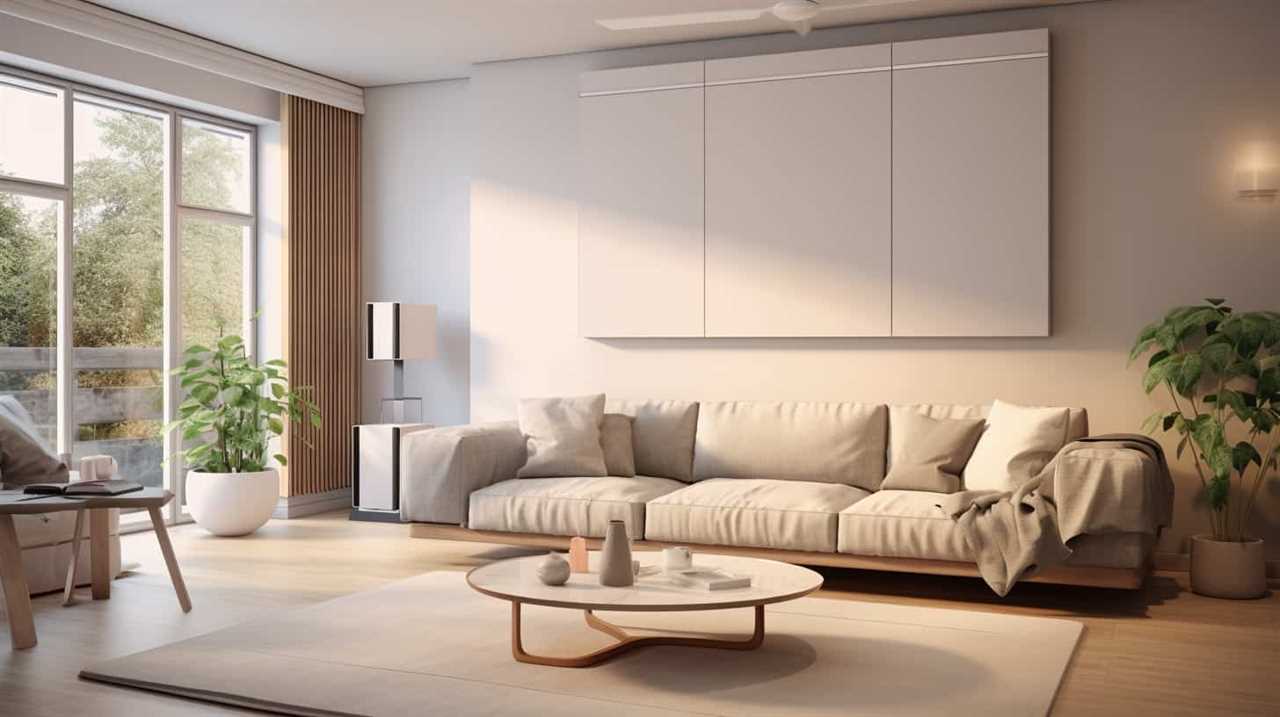
Cleaning the Filters: Dirty filters can restrict airflow and reduce efficiency. Regularly clean or replace filters to maintain optimal airflow.
Inspecting and Cleaning the Coils: Over time, coils can accumulate dirt and debris, hindering heat transfer. Regularly inspect and clean the coils to improve efficiency.
Checking Refrigerant Levels: Proper refrigerant levels are crucial for the heat pump’s performance. Regularly check and adjust refrigerant levels as needed.
By following these maintenance tasks, you can keep your heat pump operating efficiently and extend its lifespan.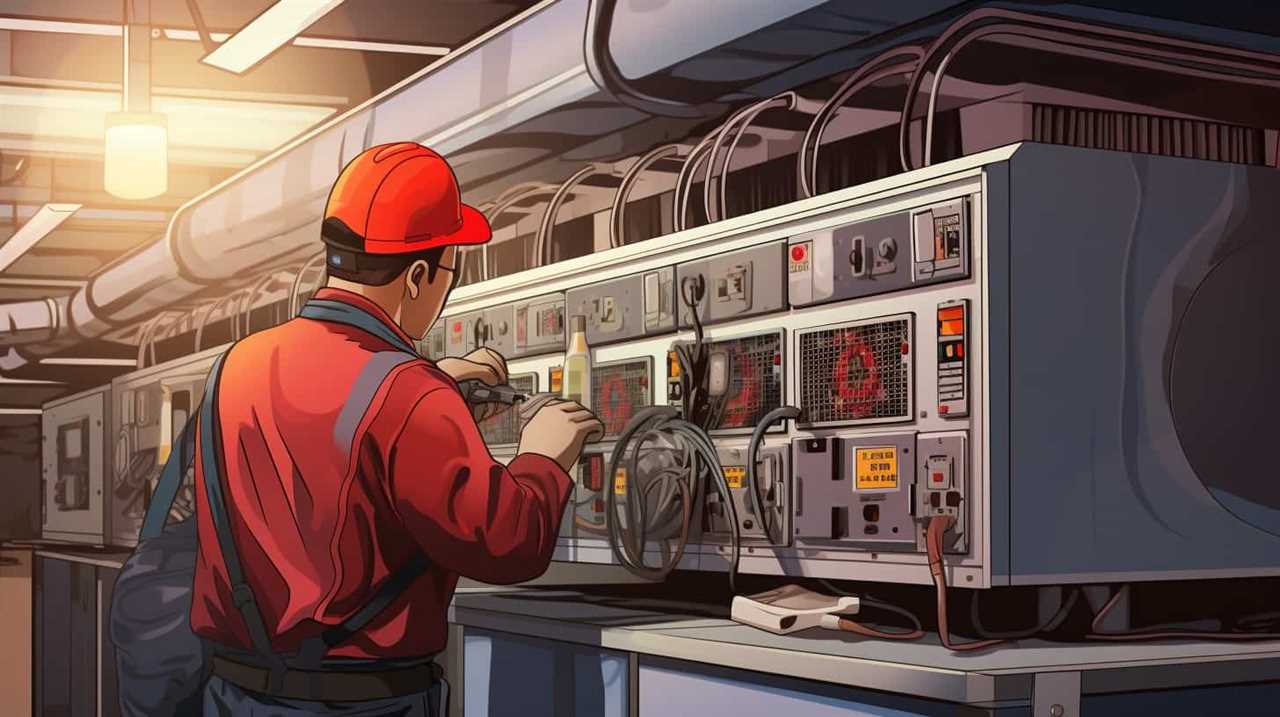
Now, let’s explore the advanced technologies for boosting HVAC heat pump efficiency.
Transition Sentence: Now that we understand the importance of regular maintenance, let’s delve into the advanced technologies that can further enhance the efficiency of HVAC heat pumps.
Advanced Technologies for Boosting HVAC Heat Pump Efficiency
Now, let’s explore how advanced technologies can enhance the efficiency of HVAC heat pumps.
One of the key advancements in boosting efficiency is the use of smart controls. These innovative systems utilize advanced algorithms and sensors to optimize the operation of heat pumps based on real-time conditions. By continuously monitoring factors such as indoor and outdoor temperatures, occupancy, and weather forecasts, smart controls can adjust the heat pump’s settings to maximize efficiency without sacrificing comfort.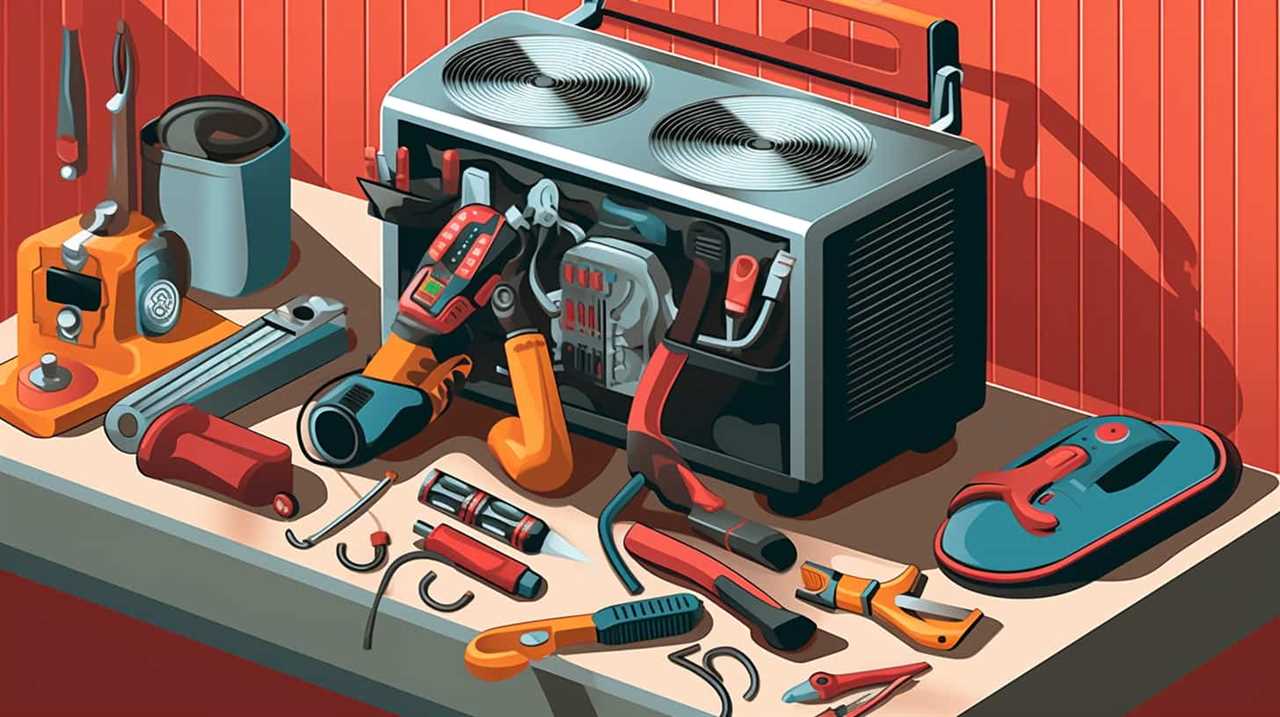
Another technology that can significantly improve HVAC heat pump efficiency is geothermal systems. These systems harness the stable underground temperature to provide heating and cooling, reducing the energy consumption of the heat pump. Geothermal systems also have the added benefit of being environmentally friendly, as they produce fewer greenhouse gas emissions compared to traditional HVAC systems.
Frequently Asked Questions
Can I Install an HVAC Heat Pump Without Proper Insulation and Still Expect It to Operate Efficiently?
Installing an HVAC heat pump without proper insulation can significantly impact its efficiency. Improper insulation can lead to energy consumption, airflow optimization, and size selection issues. Regular maintenance and the use of advanced technologies can enhance efficiency.
How Can I Improve the Airflow in My HVAC Heat Pump System to Enhance Its Performance?
To enhance our HVAC heat pump system’s performance, we must optimize fan speed and improve air circulation. These steps are crucial in achieving maximum efficiency and ensuring the liberation of our system’s full potential.
What Factors Should I Consider When Selecting the Right Size Heat Pump for My Home to Ensure Maximum Efficiency?
When selecting the right size heat pump for our home, we must consider factors like the square footage, insulation, and climate. Ensuring maximum efficiency requires finding the balance between capacity and energy consumption.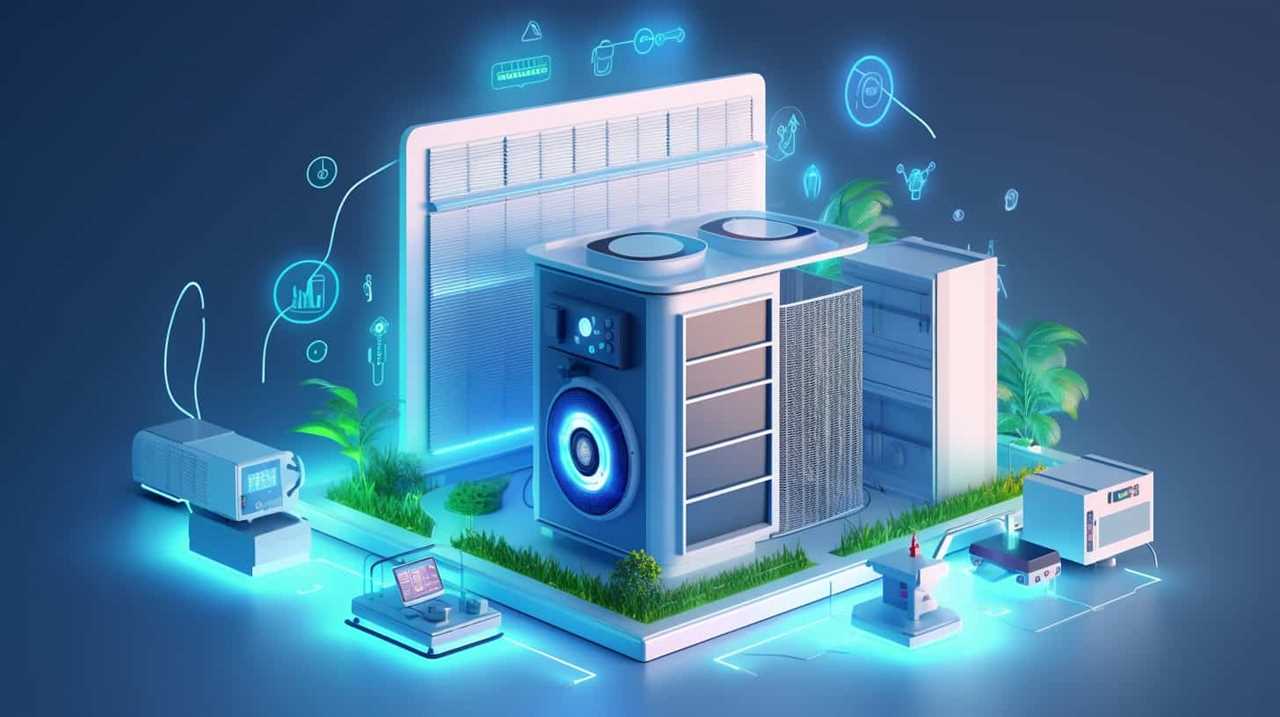
Is Regular Maintenance Necessary for HVAC Heat Pump Efficiency, and if So, How Often Should It Be Done?
Regular maintenance is crucial for HVAC heat pump efficiency. Neglecting it can significantly impact performance. To ensure longevity, we recommend scheduling maintenance regularly. Don’t underestimate the importance of this vital step in optimizing your system.
Are There Any Advanced Technologies Available That Can Further Boost the Efficiency of HVAC Heat Pumps, and How Do They Work?
Yes, there are advanced technologies available that can further boost the efficiency of HVAC heat pumps. These technologies work by optimizing energy usage, improving heat transfer, and incorporating smart controls for optimal performance.
What Are Some Insider Secrets to Maximize the Efficiency of Heat Pumps in HVAC Systems?
Maximizing heat pump efficiency secrets can significantly improve the performance of HVAC systems. Regular maintenance, such as cleaning or replacing air filters, ensures unrestricted airflow and optimal heat transfer. Properly insulating ductwork and sealing gaps reduce energy loss. Setting the thermostat at an appropriate temperature and using programmable features can avoid unnecessary energy consumption. Moreover, scheduling professional check-ups and considering upgrades or eco-friendly refrigerants can further enhance heat pump efficiency.
Conclusion
In conclusion, the efficiency secrets of HVAC heat pumps lie in proper insulation, optimized airflow, selecting the right size heat pump, regular maintenance, and advanced technologies.
These factors work together to enhance performance and maximize efficiency. Just like a well-oiled machine, a well-maintained HVAC heat pump operates smoothly and effectively, providing optimal heating and cooling while minimizing energy consumption.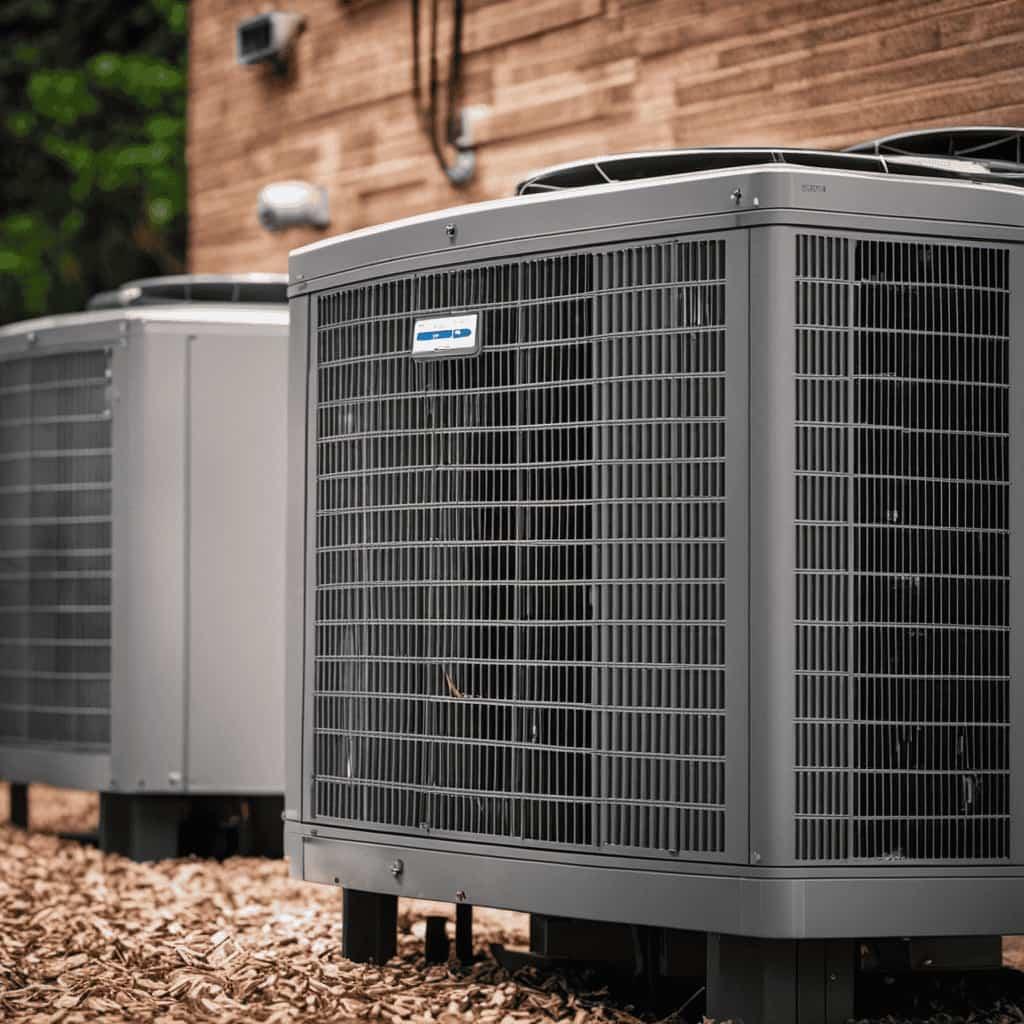
It’s like having a sleek, high-performance sports car that effortlessly glides through any climate.
Climate Control
Are Your Heat Pumps Energy-Efficient? Test With These Tips

Is your **heat pump** truly as energy-efficient as it claims to be? Test its efficiency with the help of these tricks. If you want to save money and reduce your energy consumption, this is the perfect opportunity to see if your **heat pump** is really doing its job. Keep reading to find out more!
We’ll break down heat pump efficiency ratings, explore proper sizing for optimal energy efficiency, and share maintenance tricks to maximize their performance.
Plus, we’ll dive into smart thermostat integration and programming tips, as well as energy-saving strategies for operating your heat pump.
Get ready to unlock the full potential of your heat pumps and enjoy the freedom of lower energy bills.
Key Takeaways
- Efficiency ratings (SEER and HSPF) determine if heat pumps are energy-efficient.
- Proper sizing and regular maintenance maximize energy savings.
- Integration of smart thermostats and programming can improve efficiency.
- Implementing energy-saving strategies such as proper installation, temperature control, and zoning can optimize heat pump operation.
Understanding Heat Pump Efficiency Ratings
We need to understand the efficiency ratings of our heat pumps to determine if they’re energy-efficient. With recent advancements in heat pump technology, there are now more energy-efficient models available on the market.
To compare the energy efficiency of different heat pump models, we can look at their efficiency ratings. These ratings are measured using a metric called the Seasonal Energy Efficiency Ratio (SEER) for cooling and the Heating Seasonal Performance Factor (HSPF) for heating. The higher the SEER or HSPF rating, the more energy-efficient the heat pump is.
When comparing energy-efficient heat pump models, it’s important to consider both the SEER and HSPF ratings to ensure that you’re making an informed decision. By understanding these efficiency ratings, we can choose heat pumps that aren’t only technologically advanced but also energy-efficient.
Proper Sizing for Optimal Energy Efficiency
Our goal is to ensure that our heat pumps are properly sized for optimal energy efficiency. Proper sizing is essential to maximize energy savings and ensure that your heat pump operates efficiently. Here are some energy saving tips to consider when it comes to proper sizing:
Consider the size of your home: The square footage of your home plays a crucial role in determining the size of the heat pump you need. A heat pump that’s too small will struggle to heat or cool your home effectively, while one that’s too large will cycle on and off frequently, wasting energy.
Insulation and air sealing: Proper insulation and air sealing are important factors affecting efficiency. Ensuring that your home is well-insulated and air sealed will help prevent heat loss or gain, allowing your heat pump to work more efficiently.
Ductwork: Properly sized and sealed ductwork is crucial for efficient heat pump operation. Leaky or improperly sized ducts can result in energy loss and reduced efficiency.
By considering these factors, you can ensure that your heat pump is properly sized for optimal energy efficiency.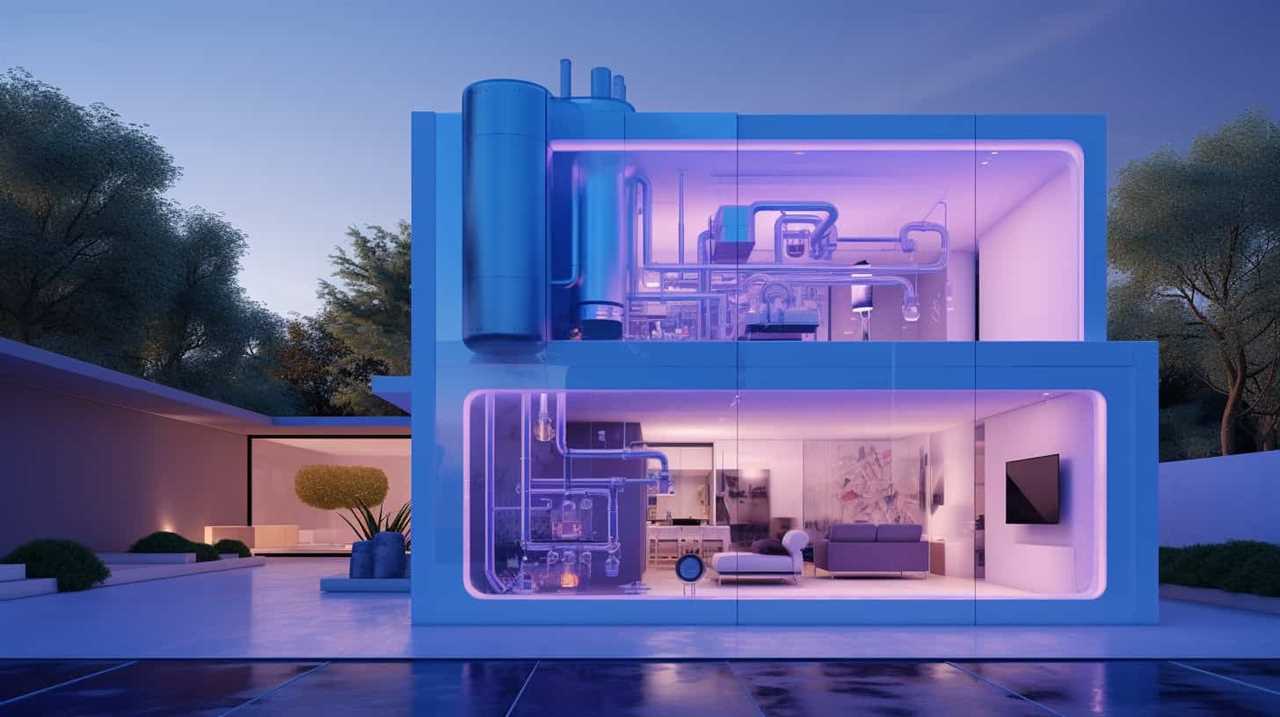
Now let’s move on to the next section, where we discuss regular maintenance to maximize efficiency.
Regular Maintenance to Maximize Efficiency
To ensure maximum efficiency, we should regularly maintain our heat pumps with proper cleaning and inspections. By following a maintenance checklist, we can keep our heat pumps running smoothly and avoid costly repairs.
First, it’s important to clean or replace air filters every one to three months. Clogged filters restrict airflow and reduce efficiency.
Next, we should inspect the outdoor unit for any debris or vegetation that may obstruct airflow. Additionally, we should check the thermostat settings to ensure they’re accurate and adjust them as needed.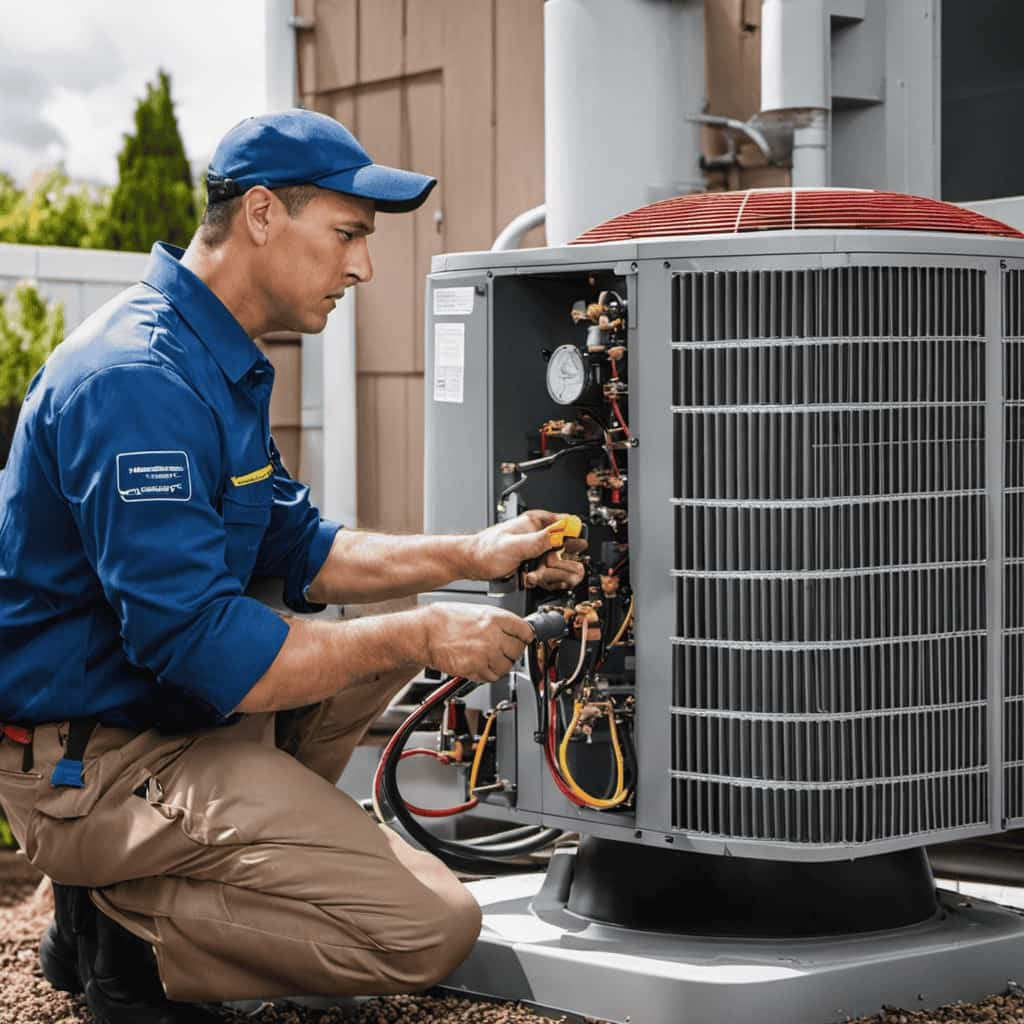
Troubleshooting tips include checking for any unusual noises, leaks, or inadequate heating or cooling performance.
Regular maintenance not only maximizes efficiency but also extends the lifespan of our heat pumps, saving us money in the long run.
Smart Thermostat Integration and Programming Tips
One key tip for integrating and programming smart thermostats is to set a schedule with specific temperature adjustments throughout the day. This allows you to maximize energy efficiency by only using heating or cooling when necessary. Smart thermostats offer a range of energy-saving features to help you achieve this goal.
Here are some tips on how to program your smart thermostat for maximum energy efficiency:
- Take advantage of the thermostat’s learning capabilities by allowing it to adapt to your schedule and preferences.
- Utilize the geofencing feature, which uses your smartphone’s location to adjust the temperature when you’re away from home.
- Use the energy-saving mode, which automatically adjusts the temperature to save energy when you’re not at home.
By programming your smart thermostat effectively, you can reduce energy waste and save money on your heating and cooling bills.
Now, let’s explore energy-saving strategies for heat pump operation.
Energy-Saving Strategies for Heat Pump Operation
To maximize energy efficiency, we can implement various strategies for operating heat pumps.
One important strategy is to ensure proper heat pump installation. This includes proper sizing and positioning of the unit, as well as ensuring proper insulation and sealing of ductwork.
Another energy-saving tip is to set the thermostat to the most energy-efficient temperature. For heating, setting the thermostat between 18-20 degrees Celsius (64-68 degrees Fahrenheit) is recommended, while for cooling, setting it between 24-26 degrees Celsius (75-78 degrees Fahrenheit) is ideal.
Additionally, it’s important to regularly clean or replace air filters to ensure optimal airflow and energy efficiency.
Finally, using a programmable or smart thermostat can help optimize energy usage by automatically adjusting temperature settings based on your schedule and preferences.
Frequently Asked Questions
How Do I Know if My Heat Pump Is Energy-Efficient?
We can determine if our heat pump is energy-efficient by considering factors such as improving insulation and the benefits of regular servicing. This helps us make informed choices and achieve energy savings.
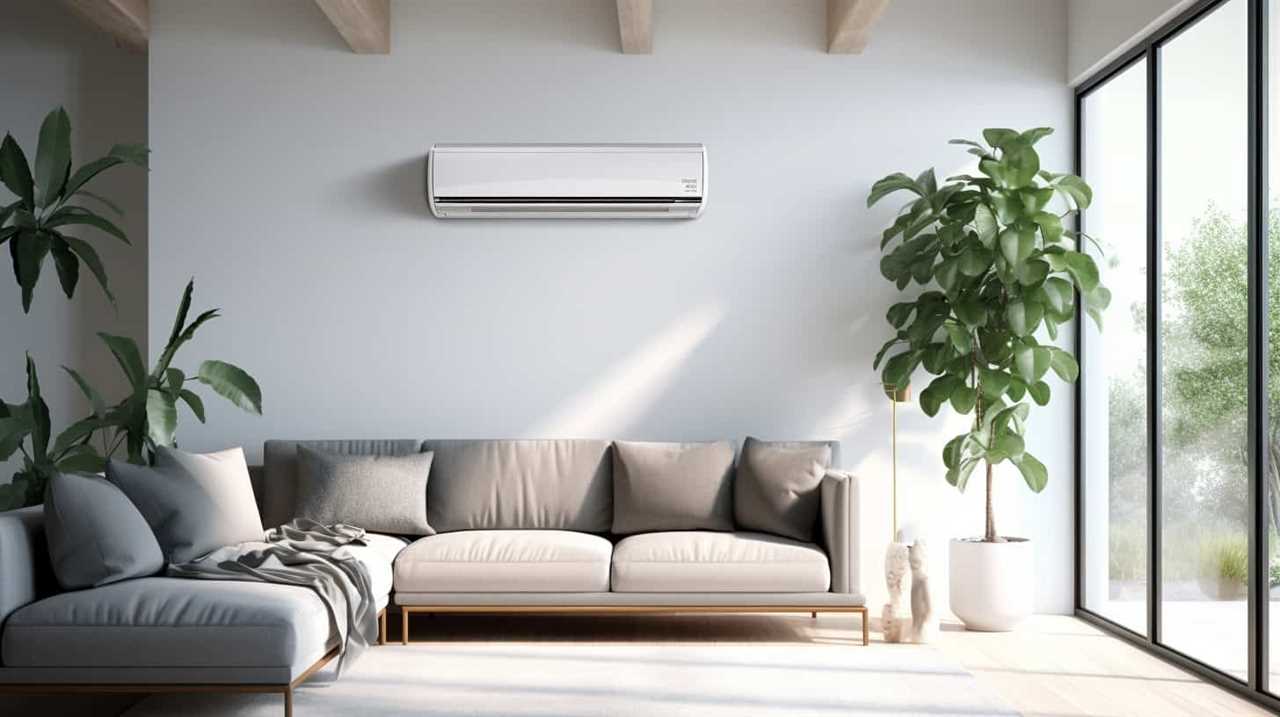
Can I Still Achieve Energy Efficiency With a Heat Pump That Is Not Properly Sized for My Home?
Yes, you can still achieve energy efficiency with a heat pump that is not properly sized for your home. However, it may not operate as efficiently as a properly sized one, leading to higher energy consumption and costs.
What Are Some Common Maintenance Tasks That Can Help Maximize the Efficiency of My Heat Pump?
Heat pump maintenance is essential for maximizing efficiency. Regularly clean or replace air filters, clear debris from outdoor units, and schedule professional inspections. These tips can help ensure our heat pumps operate at peak energy efficiency.
Are There Any Specific Tips for Integrating a Smart Thermostat With a Heat Pump for Optimal Energy Efficiency?
Integrating a smart thermostat with our heat pumps can optimize energy efficiency. We can save more by utilizing energy-saving features such as programmable schedules, remote access, and smart algorithms that adapt to our preferences.
Besides Regular Maintenance and Smart Thermostat Integration, What Other Strategies Can I Adopt to Save Energy While Operating My Heat Pump?
Energy saving habits, such as setting a programmable thermostat and keeping the temperature moderate, can help save energy when operating heat pumps. Additionally, proper insulation techniques can prevent energy loss and increase efficiency.
What Are the Secrets to Ensuring Optimal Heat Pump Efficiency in Eco-Buildings?
Achieving optimal heat pump efficiency in eco-buildings requires a multi-faceted approach. Firstly, proper insulation and airtight construction minimize heat loss or infiltration. Secondly, regular maintenance and clean air filters ensure optimal heat exchange and airflow. Lastly, employing smart thermostat systems that optimize temperature settings and take advantage of renewable energy sources further enhance heat pump efficiency in eco-buildings.
Conclusion
In conclusion, understanding and maximizing the efficiency of your heat pump is crucial for saving energy and reducing costs.
By considering heat pump efficiency ratings, sizing, regular maintenance, and integrating a smart thermostat, you can optimize its performance.
Implementing energy-saving strategies will also help to ensure your heat pump operates at its best.
So, take control of your energy usage and let your heat pump work smarter, not harder, to keep you comfortable all year round.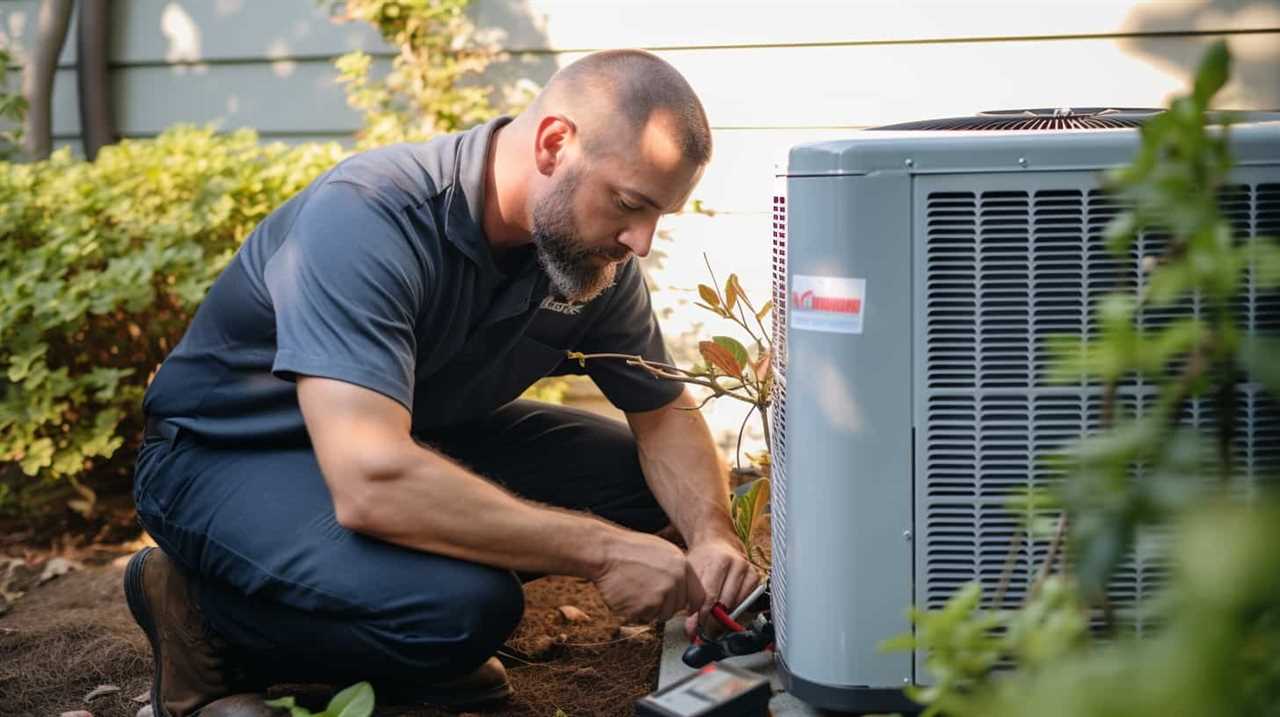
Climate Control
Unveiling the Thrifty Power of Energy-Efficient Heat Pumps

We’ve all experienced that feeling – anxiously awaiting the arrival of our monthly energy bill, trying to find ways to save money we worked hard for.
Well, look no further. Energy-efficient heat pumps are here to revolutionize the way we think about heating our homes. With their thrifty power, these innovative devices not only reduce energy consumption but also provide substantial long-term cost savings.
Let’s dive into the world of energy-efficient heat pumps and unveil the secrets to financial success and sustainability.
Key Takeaways
- Energy-efficient heat pumps can significantly reduce monthly utility bills through their energy consumption savings.
- Conducting a cost analysis is crucial to understand the cost-effectiveness of energy-efficient heat pumps, including evaluating initial investment cost, energy savings, and payback period.
- Energy-efficient heat pumps offer financial benefits such as lower utility bills, reduced maintenance costs, and potential incentives and rebates.
- Energy-efficient heat pumps provide long-term cost savings through reduced energy consumption, lower maintenance expenses, and longer lifespan.
Cost-Effectiveness of Energy Efficient Heat Pumps
We’ve discovered that energy efficient heat pumps can significantly reduce our monthly utility bills. To truly understand the cost-effectiveness of energy efficient heat pumps, a comprehensive cost analysis is necessary.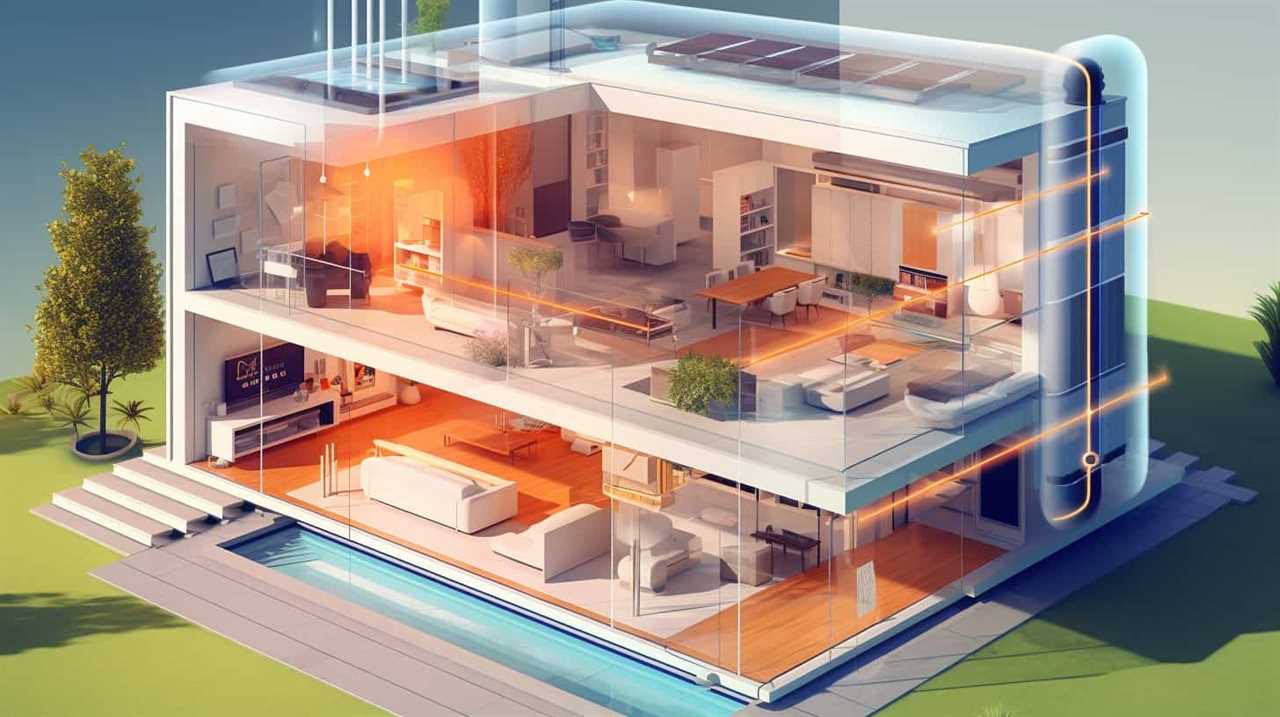
This analysis entails evaluating the initial investment cost, energy consumption savings, and the payback period. The initial investment cost includes the purchase and installation of the heat pump, as well as any necessary modifications to the existing infrastructure.
By comparing the energy consumption of energy efficient heat pumps to traditional heating systems, we can determine the potential savings over time. The payback period is the time it takes for the energy savings to offset the initial investment cost.
Through careful cost analysis, we can ascertain the financial benefits of energy efficient heat pumps and make informed decisions regarding their implementation.
Savings Potential of Energy-Efficient Heat Pumps
We can maximize our savings by utilizing energy-efficient heat pumps and making smart choices about our energy consumption. Energy-efficient heat pumps offer significant energy savings compared to traditional heating and cooling systems. By reducing energy consumption, we not only save money on our utility bills but also reduce our environmental impact.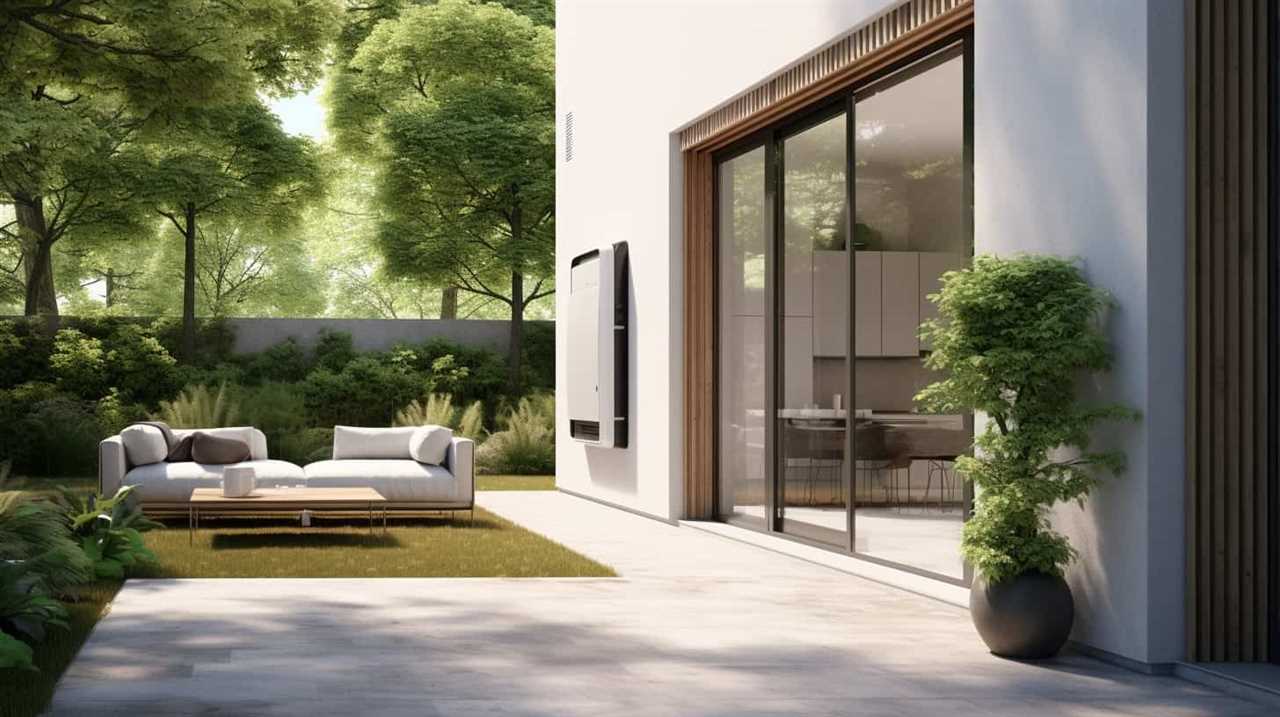
To illustrate the potential savings of energy-efficient heat pumps, let’s take a look at the following table:
| Energy Consumption | Annual Cost (Traditional System) | Annual Cost (Energy-Efficient Heat Pump) |
|---|---|---|
| Heating | $900 | $600 |
| Cooling | $800 | $500 |
| Total | $1,700 | $1,100 |
As we can see, by using energy-efficient heat pumps, we can save $600 per year on heating and $300 per year on cooling, resulting in a total annual savings of $600. Not only do these savings benefit our wallets, but they also contribute to a greener and more sustainable future.
Return on Investment for Energy-Efficient Heat Pumps
To determine the return on investment for energy-efficient heat pumps, let’s analyze the cost savings and payback period compared to traditional heating and cooling systems.
Conducting an ROI analysis is crucial in understanding the benefits of energy-efficient heat pumps and making informed decisions about their implementation.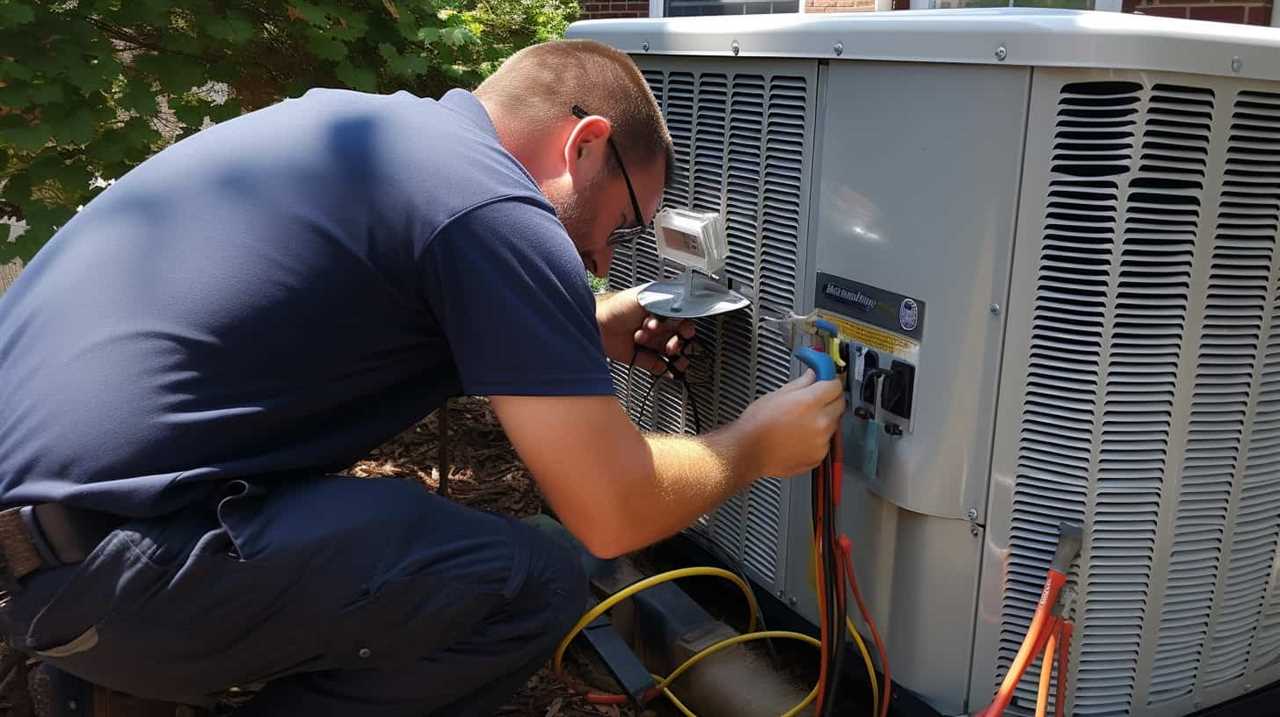
Energy-efficient heat pumps have several advantages that contribute to their positive ROI. Firstly, they consume significantly less energy compared to traditional systems, resulting in lower utility bills and operational costs.
Secondly, they’ve a longer lifespan and require less maintenance, reducing the overall expenses associated with heating and cooling.
Thirdly, energy-efficient heat pumps often qualify for various incentives and rebates, further enhancing their financial viability.
Lastly, their ability to provide both heating and cooling in a single system eliminates the need for separate units, saving on installation and equipment costs.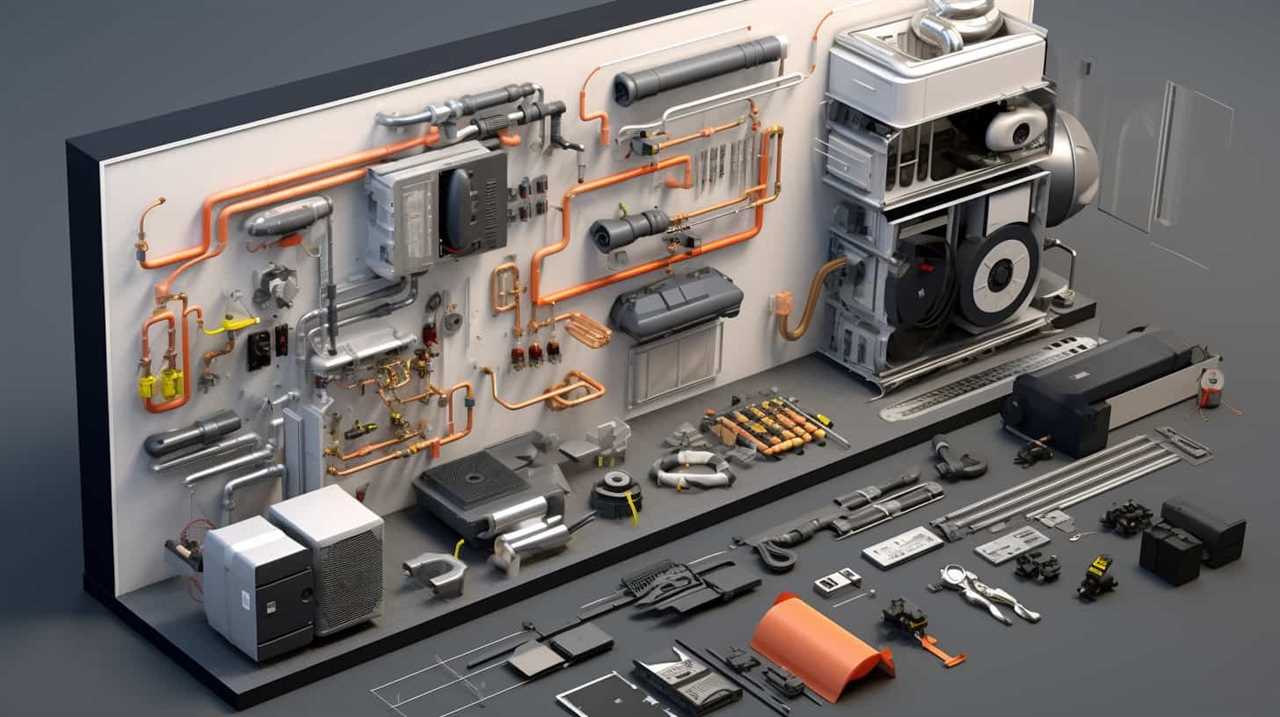
Financial Benefits of Choosing Energy-Efficient Heat Pumps
Choosing energy-efficient heat pumps provides both cost savings and environmental benefits. Not only do these heat pumps reduce energy consumption, but they also qualify for tax credits, further reducing their upfront cost. Additionally, energy-efficient heat pumps require less maintenance, leading to reduced maintenance costs in the long run.
To illustrate the financial benefits of choosing energy-efficient heat pumps, consider the following table:
| Financial Benefit | Description |
|---|---|
| Tax credits | Energy-efficient heat pumps qualify for tax credits, reducing the initial investment. |
| Reduced maintenance costs | Energy-efficient heat pumps require less maintenance, resulting in lower overall maintenance expenses. |
Long-Term Cost Savings With Energy-Efficient Heat Pumps
Over the course of several years, energy-efficient heat pumps can lead to significant long-term cost savings. Here are four reasons why investing in these pumps can result in substantial financial benefits:
Energy Efficiency: Energy-efficient heat pumps are designed to consume less electricity while providing the same level of heating or cooling. This translates to lower energy bills over time, resulting in long-term savings.

Reduced Maintenance Costs: Energy-efficient heat pumps are built with advanced technology that improves their durability and reliability. This means fewer breakdowns and repairs, leading to reduced maintenance expenses in the long run.
Government Incentives: Many governments offer incentives and rebates to encourage the use of energy-efficient appliances, including heat pumps. These financial incentives can help offset the initial investment and accelerate the payback period.
Environmental Impact: By consuming less energy, energy-efficient heat pumps contribute to reduced greenhouse gas emissions and environmental impact. This not only helps protect the planet but also positions homeowners as environmentally conscious individuals.
Frequently Asked Questions
How Does the Installation of Energy-Efficient Heat Pumps Impact the Overall Value of a Home?
Installing energy-efficient heat pumps positively impacts the overall value of our homes. They reduce energy consumption and provide long-term cost savings. These innovative systems are a smart investment for those seeking to minimize expenses and maximize efficiency.

Are There Any Government Incentives or Rebates Available for Purchasing Energy-Efficient Heat Pumps?
There are government incentives and rebates available for purchasing energy-efficient heat pumps. The installation of these pumps can also positively impact the overall value of a home.
Can Energy-Efficient Heat Pumps Be Used in Both Residential and Commercial Settings?
Yes, energy-efficient heat pumps can be used in both residential and commercial settings. A cost effectiveness analysis shows that these pumps can significantly reduce energy consumption and save money in the long run.
Are There Any Maintenance Costs Associated With Owning an Energy-Efficient Heat Pump?
Yes, there are maintenance costs associated with owning an energy-efficient heat pump. However, these costs are offset by the substantial energy savings that the heat pump provides, making it a thrifty investment in the long run.
What Are the Environmental Benefits of Using Energy-Efficient Heat Pumps Compared to Traditional Heating Systems?
Using energy-efficient heat pumps instead of traditional heating systems can lead to significant cost savings and a reduction in greenhouse gas emissions. For example, a case study showed a 40% decrease in energy consumption and a 30% decrease in carbon emissions.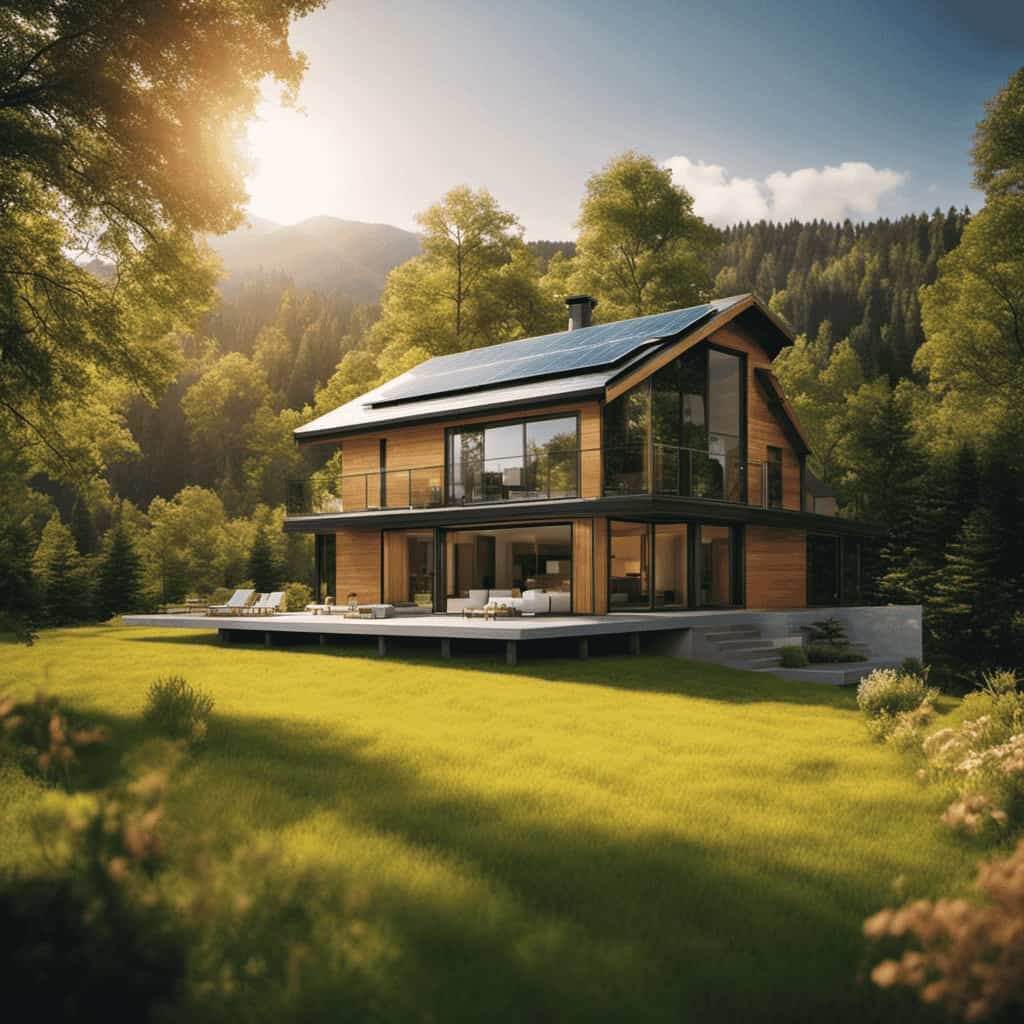
What Are the Benefits of Using Energy-Efficient Heat Pumps for Climate Control?
If you’re searching for cost-effective and environmentally friendly ways to regulate indoor climate, look no further than the perks of heat pumps for climate control. By efficiently transferring heat from one place to another, these systems provide optimal heating and cooling all year round. Enjoy reduced energy consumption, lower utility bills, and a smaller carbon footprint, all while maintaining a comfortable home temperature.
Conclusion
In conclusion, the cost-effectiveness of energy-efficient heat pumps is undeniable. With a potential savings of up to 50% on heating costs, the return on investment for these systems is impressive.
Choosing energy-efficient heat pumps not only provides financial benefits but also leads to long-term cost savings. Embracing this thrifty power can significantly impact our energy consumption and contribute to a more sustainable future.
-

 Residential and Commercial Applications2 weeks ago
Residential and Commercial Applications2 weeks agoBest Amana Heat Pump Reviews
-

 Thermal Energy Transfer2 weeks ago
Thermal Energy Transfer2 weeks agoBreakthroughs in Modern Heat Pump Systems: Thermal Energy Edition
-

 Residential and Commercial Applications2 weeks ago
Residential and Commercial Applications2 weeks agoBest Heat Pump
-

 Geothermal Heat Pumps3 months ago
Geothermal Heat Pumps3 months agoUpgrade Your Comfort with Our Efficient HVAC Systems
-

 Air Conditioning3 months ago
Air Conditioning3 months agoExploring Energy-Efficient Air Conditioning Heat Pumps
-

 Geothermal Heat Pumps3 months ago
Geothermal Heat Pumps3 months agoInnovative Geothermal Heat Pump Manufacturers Revolutionize Energy Efficiency
-

 Thermal Energy Transfer1 month ago
Thermal Energy Transfer1 month agoBoost Your Heat Pump Efficiency: Interactive Guide
-

 Residential and Commercial Applications2 weeks ago
Residential and Commercial Applications2 weeks agoBest Portable Heat Pump Heat & AC










